




































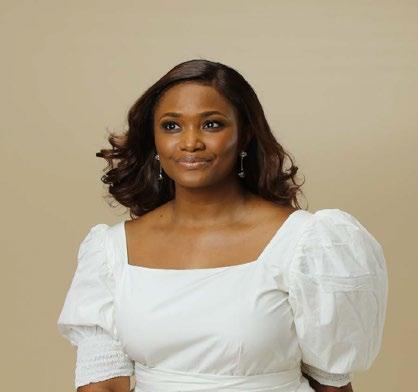
Every year, our anniversary issue clashes with our Valentine’s issue, so we decided to have our Valentine’s issue early. In honour of Valentine’s Day, which is around the corner, we highlight five rumoured or actual couples that have had the internet abuzz with their relationship.









In a world where love and stardom meet, some couples are in the limelight, making us swoon and go, aww. These duos rouse trending headlines, whether from their chemistry, public display of affection, or their being in synch.
Although in some cases, we’ll never know if the love we see online is real or staged, like in the case of Burna Boy and Chloe Bailey, we, the onlookers, view them as a perfect couple, so we become fans of the pair.
These couples live their lives differently. While some are private and easygoing, others are loud and extravagant about their relationships, constantly showing admiration for each other on their social media pages. Either way, we can’t help but stay hooked on these couples.
Scroll to pages 8 to 10 to view the internet’s most talked about unmarried couples.
#Unshakable Truths discusses the letter X this week, and X is for Chapter X: The Stories we Don’t Tell. There are many chapters in our lives, and each chapter makes us proud or not so proud. I, for one, know that there are chapters of my life that I wouldn’t even read, let alone read aloud. And we all have those skeletons in our closets that need to stay locked up in that closet, never to see the light of day. The question I asked myself after reading Sally’s stories was, “How long can we put off not reading that chapter?”
Until next week, enjoy your read.







SUNDAY, FEBRUARY 2, 2025

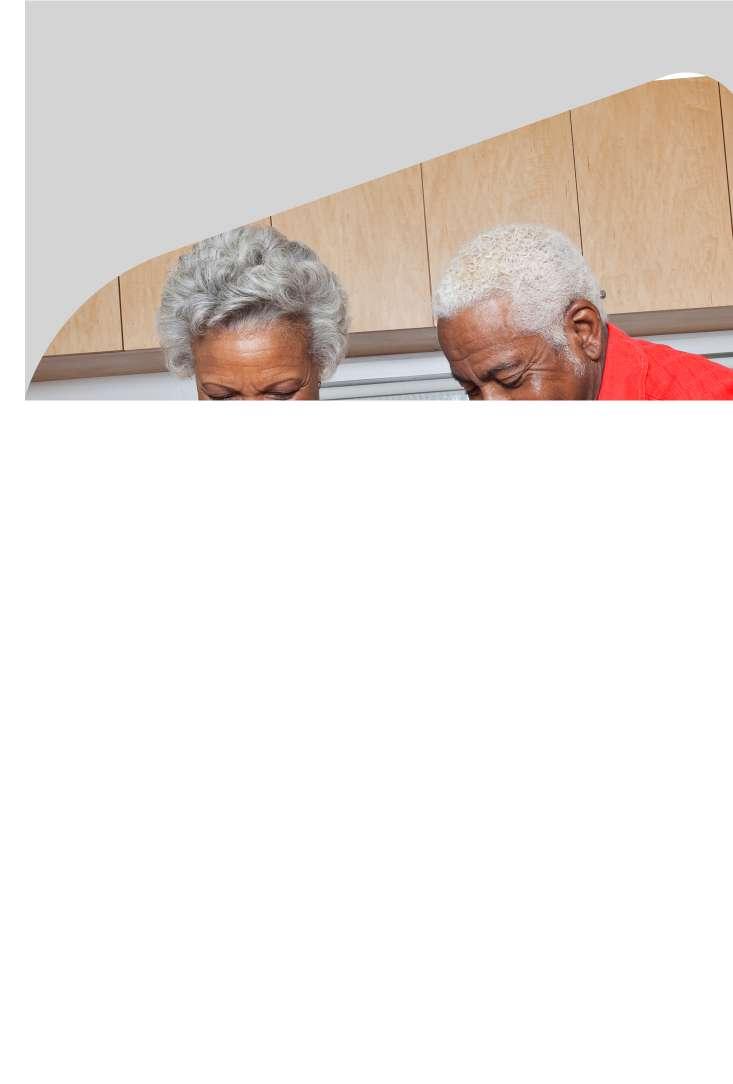



SUNDAY, FEBRUARY 2, 2025


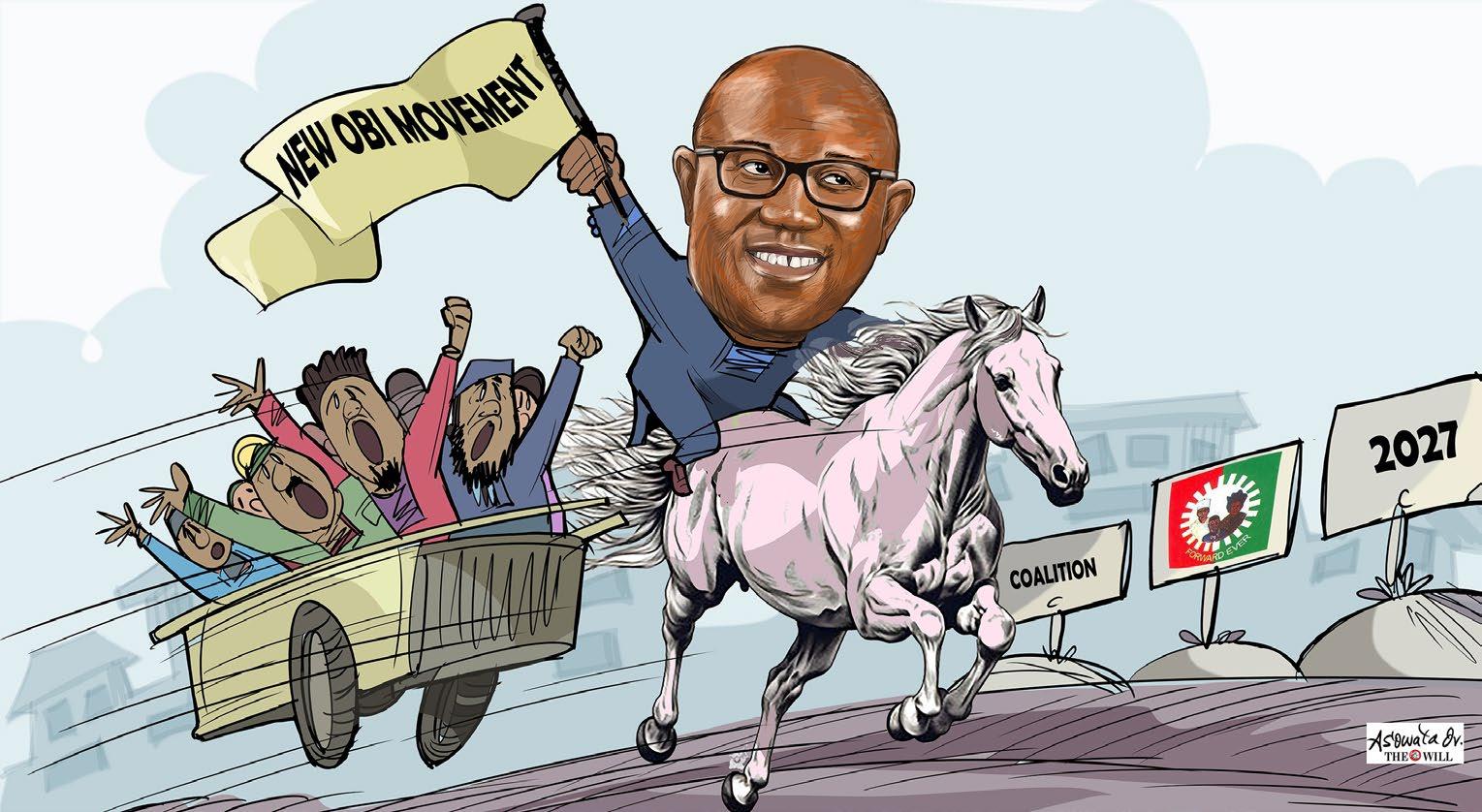
BY AMOS ESELE
Against the backdrop of the growing advocacy for coalitions or alliances among opposition political leaders in the country, ahead of the 2027 General Election, the reorganisation of the ‘Obidient’ Movement could not have come at a better time.
One of the central figures in this ongoing political strategy is the Presidential candidate of the Labour Party in the 2023 general election, Peter Obi. On Thursday, the former Anambra State governor approved a new structure for the ‘Obidient’ Movement globally.
National Coordinator, ‘Obidient’ Movement, Dr Tanko Yunusa, who confirmed this approval, said the movement wants to build on its past successes as the next step towards consolidation.
“The Obidient Movement started as an amorphous organisation with no leadership or coordination. Now, we are restructuring the movement as an organisation with His Excellency, Peter Obi as the leader. I am only coordinating. We need a leader to revert to. He (Obi) needs to know the people he is working with and the organisation he is leading,” Yunusa told THEWILL on Friday.
For context, Yunusa likened the movement to the Peoples Democratic Movement, PDM, a pan-Nigeria political movement led by the late
former Chief of Staff, Gen Shehu Musa Yar’Adua and which later formed the backbone of the Peoples Democratic Party, PDP, in 1998 and the Kwankwasiyya Movement led by former Kano Governor, Dr. Rabiu Kwankwaso, Presidential candidate of the New Nigeria Peoples Party (NNPP) in the 2023 general election.
“Obidient’ Movement cuts across political parties. It is a structure meant to build and coordinate activities of the ‘Obidient’ movement worldwide. That way, we would not be running across purposes. If and when the decision about 2027 is to be taken, it will be an organisational decision,” Yunusa said in response to THEWILL’s questions relating to the 2027 general elections.
Although Yunusa declined to comment on the likely impact of this new development on the Labour Party that is still reeling from a leadership crisis, THEWILL learnt that the decision to reorganise the Obidient movement has unsettled some of the key leaders of its National Working Committee, NCW.
Indeed, he was appointed coordinator of the movement in August 2024 with little or no action






Wednesday, the first reaction by even Obidient members within the ranks of the LP was first, one of disbelief and then public protest.
The reaction of Hilda Dokubo, Chairperson of the party in Rivers State, symbolised this reaction. On the night of that Wednesday after the announcement made headlines during the day, she expressed concerns about divisive actions within the party, emphasising the need for unity and reconciliation.
In a brief statement, she said, “My attention has been drawn to a list making the rounds on social media, purportedly by a group, the Obidient Movement Advisory Council, wherein my name was listed as a member of the Supporting Advisory Council. I need to state clearly that I was not consulted by the organisers of the group before my name was included in the said list.
“I must also state clearly that I am the Chairman of the Labour Party in Rivers State under the leadership of Barrister Julius Abure. I can, therefore, not take on the burden of becoming a member of the Supporting Advisory Council of the Obidient Movement Advisory Council.”
However, Yunusa claims she was consulted. “The truth is that Dokubo was consulted. I spoke with her a few minutes before the membership list was announced. She gave reasons why she needed to lie low now. But in her statement, she has shown where her loyalties lie. We are all Labour Party people.”
Still, her statement did not go down well with the leaders and members of the party in Rivers State. In a statement signed by organising secretary and spokesperson of the group, Gogo Wellington, which was obtained by THEWILL, the leaders and members of the party in the state said they were dissociating themselves from her statement and pledged support for Peter Obi and Chairman of the Caretaker committee of the party, led by Senator Esther Nenadi Usman.
Wellington said, “We remain resolute and committed to the vision of our leader, Peter Obi and the Chairman of the Labour Party Caretaker Committee, Senator Nenadi Esther Usman. We are well aware of the nocturnal relationship and transactions between Hilda Dokubo and Julius Abure which saw to her emergence as caretaker chairman of the party in Rivers State. The Labour Party and Obidient Movement in Rivers State is way bigger than one individual’s thing, hence Dokubo’s position changes nothing about the position of the members of the Labour Party and the Obidients in Rivers State.”
Efforts to reach the Spokesperson of the LP, Obiorah Ifoh, were unsuccessful. Repeated messages and phone calls to his phone were not answered or returned.
The leadership crisis in the LP took a new turn a fortnight ago when the 29-member caretaker committee headed by Senator Nenadi Usman
rejected the Appeal Court ruling that affirmed Julius Abure as National Chairman.
The caretaker committee, established by Abia State Governor, Alex Otti, the Nigeria Labour Congress and Obi to reconcile aggrieved members, said it would head to the Supreme Court for final arbitration on the matter, warning Abure to stop parading himself as the party’s national chairman.

Governor Otti, NLC and Obi had set up the committee to manage the affairs of the party after they kicked against the Abure-led NWC, which held on to power following their re-election at a national convention in March 2024.
According to Senator Usman, despite the court ruling, the committee remains in charge of the party’s affairs by virtue of the mandate entrusted to them by party stakeholders at an emergency convention held in Aba in September, 2024.
Nevertheless, Abure’s victory at the Court of Appeal in Abuja, also validated the party’s March 2024 national convention held in Nnewi, Anambra State.
Presiding Justice of the Appeal Court, Hamma Barka, said a previous judgement delivered on November 13, 2024, in Appeal Number CA/ Abj/CV/1172/2024 between the Labour Party (appellant) and Chief Olusola Ebiseni, alongside the Independent National Electoral Commission as respondents, was still relevant.
Ruling on two separate appeals filed by Senator Esther Usman, the caretaker committee and the Independent National Electoral Commission, INEC, the appellate court held on January 17, 2024 that the LP’s leadership issues were not justiciable.
It ruled that any action taken outside its jurisdiction was null and void. Consequently, the judgement of the Federal High Court, delivered on October 8, 2024, by Justice Emeka Nwite, was deemed invalid and subsequently struck out.
“Yunusa likened the movement to the Peoples Democratic Movement, PDM, a pan-Nigeria political movement led by the late former Chief of Staff, Gen Shehu Musa Yar’Adua and which later formed the backbone of the Peoples Democratic Party, PDP, in 1998 and the Kwankwasiyya Movement led by former Kano Governor, Dr. Rabiu Kwankwaso
At a meeting of national chairman of political parties with the Chairman of INEC, Mahmood Yakubu, in Abuja last week, Abure told journalists that he was sure that all the members and leaders of the LP will put aside their differences and once again speak authoritatively with one voice and come out stronger and very effective in the political space. “There is no political party without some differences; it is a game of interests, and there will always be conflicting interests in every political environment,” he said.
With the Abure-led NWC planning to hold wards congresses this month, and the Senator Usman National Caretaker Committee’s continued assertion of their authority, the leadership crisis in the party will continue to fester, making it difficult for Obi to forcefully pursue his presidential bid on the LP platform as the politics of 2027 gathers momentum.
According to a dependable party source, the lingering leadership crisis in the party is affecting Obi’s position on ongoing political discussions towards the forthcoming 2027 general election, even as he is quietly working with other leaders to bring the warring parties to the conference table.
The source expressed support for the party’s idea to organise ward congresses because of the local government elections that will be held in some states in the country, adding that the party needs to be present in all the wards in the country ahead of the 2027 polls.
“This is also the reason behind the approved new structure for the ‘Obidient’ Movement. We need to be present in all the wards and units across the country. By the second to last quarter of the year when political activities are expected to increase, we would be waiting to see some new directions and receive instructions from Obi. For now, he has said nothing about the political direction of the movement,” the source said on condition of anonymity.
The only public political statement indicating Obi’s outlook for 2027, is his remark on the sidelines of a two-day national conference on strengthening democracy in Nigeria held last Monday in Abuja.
The former Anambra governor who is said to have held alliance talks with former Vice President of Nigeria and presidential candidate of the PDP in 2019 and 2023, Atiku Abubakar, told journalists - “I have not and will never advocate any coalition or alliance that does not prioritise the welfare and progress of the ordinary Nigerian. Any discussion about governance must be centred on what it means for everyday Nigerians and how it will address critical issues, such as access to quality healthcare and education and pulling people out of poverty. Leadership must be about service, not self-interest. As I have always maintained, a new Nigeria is possible.”

Governor of Lagos State, Mr. Babajide SanwoOlu (right) exchanging greetings with the Ambassador of France to Nigeria, Amb. Marc Fonbaustier (2nd left), while the Consul General of France in Lagos, Mr. Laurent Favier, watches, during a courtesy visit by the French envoy, at the Lagos House, Marina on January 29, 2025.

The trial of former Acting Accountant General of the Federation, Mr. Chukwunyere Anamekwe Nwabuoku began on Friday, before Justice James Omotosho of the Federal High Court, Maitama, Abuja with witnesses narrating how the defendant as former Director, Finance and Account in the Federal Ministry of Defence opened multiple bank accounts through which he allegedly diverted the ministry’s funds.
The Economic and Financial Crimes Commission, EFCC, is prosecuting Nwabuoku on a nine-count amended charge, bordering on money laundering to the tune of N868, 465,000 (Eight Hundred and Sixty-eight Million, Four Hundred and Sixty-five Thousand Naira).
At Friday’s proceedings, Prosecution Counsel, Ekele Iheanacho, SAN, presented two witnesses. The first, Prosecution Witness, PW1, Eucharia Ezeobi, a Zenith Bank staff, while being led in evidence disclosed that she opened four companies’ accounts, namely: Temeeo Synergy Concept Limited, Turge Global Investment Limited, Laptev Bridge Limited and Arafura Transnational Afro Limited meant for contractors with the Federal Ministry of Defence and further disclosed that much of the funds moved from the accounts were done by cash
withdrawals, a move which she said, the defendant significantly benefited from.
The accounts opening packages, marked Exhibits PWB” were identified by the witness when they were shown to her by the court as prayed by defence counsel, Isidore Udenko.
On his part, the Second Prosecution Witness, PW2, Felix Nweke, who was the Deputy Director, Account and Expenditure under the supervision of Nwabuoku as the Director Finance and Account, Ministry of Defence, told the court that the defendant instructed him to open the four companies’ accounts and subsequently moved funds from the Federal Ministry of Defence Security Operation Account to the companies’ accounts. He further disclosed that funds in the accounts were usually withdrawn in cash and handed over to the defendant.
The defence counsel sought to know from PW2 if the withdrawals were initiated by the defendant alone or if there was an authority higher than him. The witness in his response disclosed that he only took instructions from the defendant, who was his boss in the ministry’s chain of command.
Justice Omotosho adjourned the matter till February 26, 2025 and March 5, 2025 for continuation of trial.
BY FELIX IFIJEH
BY UDEME UTIP, UYO
The National Orientation Agency has cautioned Nigerians against overcrowding in homes and public spaces, warning that such conditions could trigger an outbreak of Cerebral Spinal Meningitis.
The Akwa Ibom State Director of NOA, Mr. Mkpoutom Mkpoutom, raised the alarm while addressing journalists in Uyo at the weekend. He noted that although CSM was previously endemic in specific regions, climate change has facilitated its spread to other parts of the country.
Mkpoutom explained that CSM, which predominantly affects children and adolescents, thrives in environments with dusty winds, low humidity, and overcrowded living conditions.
He said, “These diseases are highly communicable and account for significant hospitalizations and deaths, especially among children and the elderly.
“Low humidity, dusty winds, and overcrowding are key contributors to the spread of CSM, with young children and adolescents being particularly vulnerable.”
He urged communities to adopt robust water sanitation and hygiene practices to curb the transmission of cholera and Lassa fever. Mkpoutom also stressed the importance of immunizing children to protect them from vaccine-preventable diseases.
Warning of the rising threat of Lassa fever in parts of the country, Mkpoutom called for heightened public health preparedness to forestall potential outbreaks.
The Defence Headquarters (DHQ) has said its troops neutralised 358 terrorists and arrested 431 others in January 2025.
Director of Defence Media operations, Major General Edward Buba, told defence correspondents in Abuja, that the troops also rescued 249 hostages, and recovered 370 weapons and 4,972 ammunitions within the period.
A breakdown of recovered weapons includes 105 AK47 rifles, 25 locally fabricated guns, 32 Dane guns, 23 pump action guns,
3,066 rounds of 7.62mm special ammo, 758 rounds of 7.62mm NATO, 980 cartridges, 72 assorted arms and 500 assorted ammunitions.
Meanwhile, in the Niger Delta region, Buba said troops arrested 59 suspected oil thieves and recovered 2,732,038 litres of stolen crude oil, 42,515 litres of illegally refined AGO, 200 litres of DPK and 2,250 litres of PMS, amongst other items. He reiterated the commitment of the military to the safety and security of Nigerians.
“Recognizing the overlapping periods of heightened risk for these diseases and the need for coordinated action, this integrated preventive campaign aims to strengthen public health preparedness and response across all 31 local government areas,” he stated.
According to him, Lassa fever cases typically surge during the dry season, from November to April, due to increased human contact with infected rodents and poor hygiene practices.
“Lassa fever remains endemic in several states, necessitating robust community education on rodent control and encouraging early treatment-seeking behavior,” he added.





L- R:Chief Executive Officer (CEO), NGX Regulation Limited (NGX RegCo), Olufemi Shobanjo; CEO, Nigerian Exchange Limited (NGX), Jude Chiemeka; Group Chairman, Nigerian Exchange Group, Alhaji (Dr.) Umaru Kwairanga; Katsina State Governor,Dr. Dikko Umar Radda; GMD/CEO, NGX Group, Temi Popoola, and MD/ CEO, Central Securities Clearing System (CSCS) Plc, Haruna JaloWaziri, during a Closing Gong Ceremony marking a significant step toward advancing the state’s economic vision through capital market opportunities in Lagos on January 30, 2025.
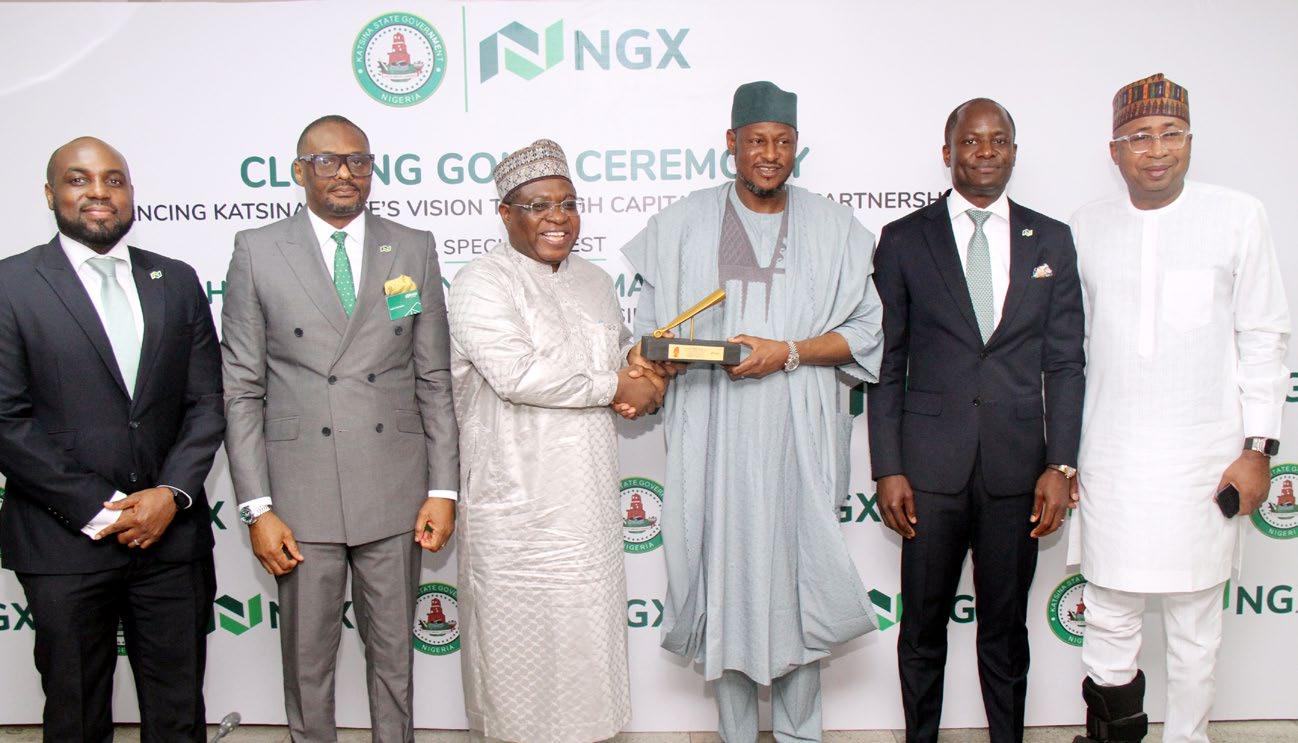
AProfessor of Criminology and Sociology of Law, Professor Etannibi Alemika, has identified bad governance and corruption in the system as responsible for the high rate of insecurity in Nigeria at the moment.
Professor Alemika, while presenting the 12th Distinguished Public Lecture at the Federal University Lokoja on Friday, declared that security agents cannot solve the problem of insecurity in any given nation alone. In his Lecture titled: Combating Insecurity Through Good Governance and Partnership Between Government and Citizens, Professor Etannibi Alemika maintained that the alarming cases of insurgency, banditry, kidnapping amongst others can only be tackled via good governance and corruption free society.
The Guest Lecturer who noted that insecurity is a global problem and not only in Nigeria, recommended that provision of basic infrastructure that would enhance the living conditions of citizens by government is the surest way to end the menace and corruption in the system. He explained that corruption on the other hand, is not only about financial inducement to perpetuate evil, but generally about not doing things in the right or correct way either to favour someone or please as the case may be.
“Citizens should strive to complement in tackling insecurity through imbibing the spirit of good character of doing the rights and avoiding the wrongs. “A nation that gives much priority to accountability, honesty, integrity and transparency will have better chances of securing lives and environment for citizens to coexist.
“Both the executive and legislative arms of government at all levels should therefore, strive to live above board in their constitutional responsibility to protect citizens against insecurity so that there will be no space for criminals to go after them.
“Poverty and Illiteracy constitute another serious threat to security of lives and property in any society. If you want security in place among nations across the globe, government of the day must ensure that poverty and Illiteracy is eradicated or reduced to the barest minimum” Professor Alemika advocated.
The Vice Chancellor of the Federal University, Lokoja, Professor Olayemi Akinwumi in his welcome address, said that the topic of the lecture is not only timely but a cherished development inview of the prevailing high level of insecurity bedeviling Nigeria presently.
Professor Akinwumi appealed to political leaders and other top government officials in the three tiers not to relent in exercising their constitutional duties to guarantee the safety of all citizens.
BY LADI DAPSON


Governors of the Lake Chad Basin from Nigeria, Niger, Cameroon and Chad, have unanimously elected Yobe state Governor, Hon. Mai Mala Buni, CON, COMN, as Chairman of the Governors’ Forum. Governor Buni was elected on Friday, at the end of the 5th Lake Chad Basin Governors’ Forum Meeting held in Maiduguri.
The meeting hosted by the Yobe State Government was declared open by President Bola Ahmed Tinubu GCFR, represented by Vice President Kashim Shettima GCON. Gov. Buni in his acceptance speech commended President Tinubu for providing leadership to the country and region at a very difficult time.
He appreciated his colleagues the Governors of the Lake Chad Basin region, delegates and all other stakeholders for attending and contributing to the success of the meeting.
“I would like to extend my deepest gratitude to His Excellency, President Bola Ahmed Tinubu, GCFR, for his leadership and commitment to peace, security, and development of the Lake Chad Basin region.
“I am convinced that, we have made our stay here in the last few days very memorable and fruitful; with justice done to the theme of the meeting “Rebuilding the Lake Chad Basin: Consolidating Gains, Commitment to Peace, Cross-Border Cooperation, Security, and Sustainable Development for a Resilient Community”, he said.
Gov. expressed hope saying “as the host governor l hope we will internalise, domesticate and act on the lessons

and resolutions of this meeting; to move forward from discussions to an all-inclusive action packed implementation that ensures everyone is carried along for the growth and development of the region. “Therefore, we look forward to a more rebust partnership, support and the needed resource allocation for us to individually and collectively actualise our shared ambition of building a better and prosperous region for our people. “It is gratifying that as we celebrate the successful end of this meeting, my colleagues have found me worthy of chairing the forum for the next two years.
“I wish to on behalf of my self, the government and people of Yobe state, commend and appreciate the decision of my colleagues for endorsing me as the new chairman of the Forum. “Let me use this opportunity to re-assure you my dear colleagues that I shall serve with a great sense of responsibility, and the commitment deserving of the office.
“l shall liaise and work closely with you and all the development partners for us to be on the same page to work for the success of the forum, and the general development of the region. “I specially thank the outgoing chairperson of this forum,
Her Excellency Ildjima Abdraman, Governor of Hadjer Lamis province, Chad for her leadership.
“On this note, l humbly accept the decision of my colleagues, and the opportunity given to me and the Yobe state government to serve as the chairman of the Forum”, Buni said.
BY ABDULLAHI YUSUF
The Kano State Government has extended the deadline for the recertification of Certificates of Occupancy (C of O) by 60 days, giving property owners more time to complete the process.
The exercise, which began on November 25, 2024, was originally scheduled to end on January 31, 2025, but will now run until April 1, 2025.
A statement issued on Wednesday by the Acting Permanent Secretary, Ministry of Land and Physical Planning, Muhammad Musbahu Yahuza, commended the overwhelming response
from the public.
He, however, acknowledged concerns over the initial deadline and assured that the extension would allow more property owners to comply.
Yahuza urged those yet to recertify their land documents to take advantage of the extended timeframe, warning that failure to do so could lead to forfeiture of property rights under existing regulations.
The recertification exercise is being conducted at the Kano State Geographic Information System office.
Governors of the Peoples Democratic Party and Acting National Chairman, Illya Damaging during their meeting in Asaba, Delta State at the weekend.
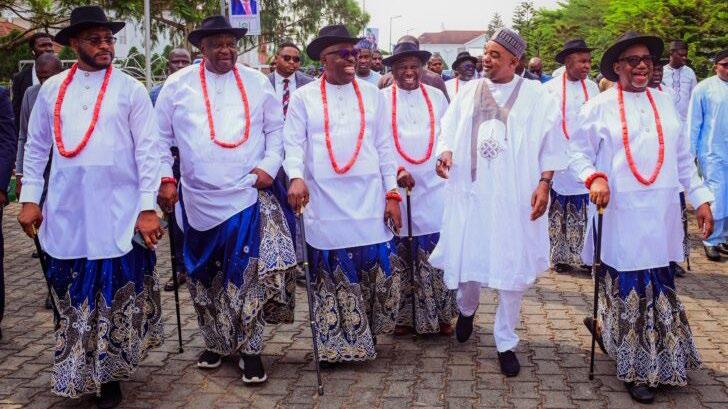
The Federal Capital Territory, FCT, Police Command and other security agencies in operation war against criminality in the nation’s capital have recovered stolen goods worth one billion naira (N1bn) from their receivers and arrested thirty one suspects during the raid on shanties.
The FCT Commissioner of Police, CP Olatunji Rilwan Disu, told newsmen on Friday, 31st January, 2025, that, members of the task force who carried out the operations include the Nigeria Police, the Nigeria Army, Nigeria Security and Civil Defence Corps (NSCDC), Department of State Services DSS, Immigration, Federal Road Safety Corps (FRSC), Nigeria Correctional Service (NCS), FCT Social Development Secretariat (SDS), Abuja Environmental Protection Agency, the National Drug Law Enforcement Agency (NDLEA) and the Abuja Development Control (ADC).
He explained that notable markets raided by the joint task force, include Dei-Dei Pantaker, Kabusa Pantaker, Dei-Dei Outward Lane Pantaker, Zuba Pantaker, Mpape Pantaker, Jabi Pantaker and Nyanya Pantaker.
According to him, the criminal activity of scavengers not only poses a significant threat to public safety but also disrupts the provision of essential amenities and jeopardizes critical infrastructure.
Some items recovered by the team as listed by CP Disu include, 115 units of manhole with the inscription ‘Not for Sale’, five motorcycles, huge volume of cables, cut to size electric-transformers, bundles of cables, a huge volume of fiber optic materials, copper wires and rubber insulators.
Other items recovered were 12 large-size solar panels, large quantities of iron rods (22 mm rods), documents related to vehicles with unverifiable ownership, fake, fabricated Mercedes Benz chassis numbers, industrial solar batteries, solar panels, weighing scales and vehicle rims among others.
Below is the extract of briefing by CP Olatunji Rilwan Disu: Ladies and gentlemen of the Press, We are pleased to highlight the outstanding accomplishments in our relentless effort against the scourge of vandalism plaguing the Federal Capital Territory (FCT). This insidious criminal activity not only undermines the very fabric of our society but also poses significant threats to public safety, disrupts the provision of essential amenities, and jeopardises the integrity of our critical infrastructure.
Through the collective efforts of all security agencies, we have made substantial strides in combating this menace, and today’s achievements serve as a testament to our unwavering commitment to safeguarding the well-being of our citizens and protecting the vital assets that underpin our nation’s prosperity.
In a bold move to tackle the menace of vandalism and theft of public infrastructure, on January 13, 2025, the Honorable Minister of the Federal Capital Territory (FCT), Bar. Nyesom Wike, CON, convened a crucial FCT Core-Security Committee Meeting with heads of security agencies.
This strategic gathering culminated in a joint task force with a directive ordering the immediate two-week closure of all scrap yards, commonly referred to as Pantaker markets, within the FCT.
The temporary closure of these markets was to dismantle the illicit trade in stolen infrastructure and scrap metals, protecting vital public assets and enhancing citizen safety.
The launch of “operation sweep” joint task force
In alignment with this directive, the FCT Police Command and other sister security agencies initiated “Operation Sweep”, a decisive enforcement action targeting the vandalisation, destruction, and illegal sale of critical infrastructure to Pantaker operators and other illicit buyers. A multi-agency task force, comprising sister security agencies within the Federal Capital Territory (FCT), launched a series of targeted operations aimed at dismantling the illicit trade in stolen infrastructure and scrap metals.
The task force includes:
– Nigerian Police; Nigerian Army; Nigeria Security and Civil Defence Corps (NSCDC); Department of State Service (DSS); Immigration; Federal Road Safety Corps (FRSC); Nigerian Correctional Service (NCS); FCT Social Development Secretariat (SDS); Abuja Environmental Protection Agency; National Drug Law Enforcement Agency (NDLEA); Abuja Development Control (ADC).
These coordinated operations focused on scrap yards, commonly known as Pantaker markets, where scavengers, referred to as Baban Bola, engage in criminal activities.
The task force aimed to displace, evacuate, and demolish makeshift shanties and illegal structures, thereby disrupting the illicit trade and ensuring peaceful public safety.
The Nigeria Police Force has said the February 1 commencement of the enforcement of the mandatory Third-Party Insurance for vehicle owners nationwide is sacrosanct.
The Force Public Relations Officer and an Assistant Commissioner of Police, Olumuyiwa Adejobi, said this in a statement on Friday.
He said the enforcement actions would include fines and other penalties, as mandated by relevant extant laws.
The FPRO said: “Effective February 1, all vehicle owners nationwide are required to possess valid Third Party Insurance as they move about.
“Those without the insurance are advised to be insured quickly to avoid any sort of embarrassment.”
He said the Inspector-General of Police, Kayode Egbetokun, had directed all Commissioners of Police nationwide to ensure due enforcement.
Adejobi said police officers would be empowered to conduct checks and enforce penalties for non-compliance in line with relevant extant laws. He said the Nigeria Police Force would remain dedicated to enhancing road safety and protecting the lives of all citizens through the enforcement of traffic laws and regulations.
The police spokesman called for cooperation from members of the public to ensure successful enforcement of the regulation.



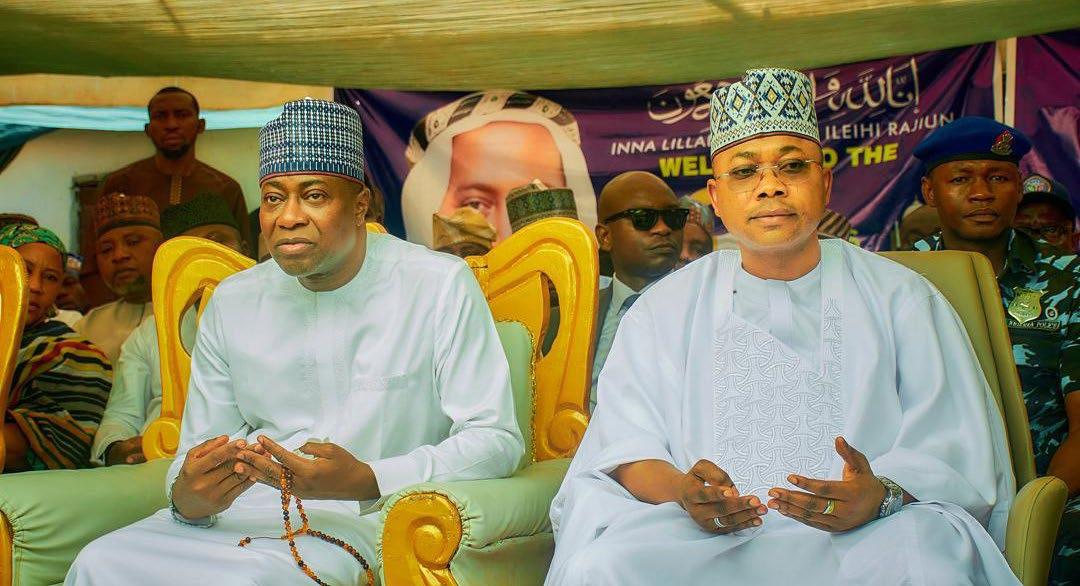
BY ABDULLAHI YUSUF
The Police in Kano have arrested the wife and other associates of a suspected terrorist, Ahmad Adam Abba, a Chadian National, wanted for masterminding the killing of 17 people in the Republic of Chad.
The Commissioner of Police in the state, Salman Dogo Garba, who disclosed this while addressing newsmen on Friday, said Abba, who is still at large, was also identified to be planning to set up a terrorist base in Kano. Garba said the police had also apprehended three of the suspect’s associates, including his wife, another Chadian named Jibrin Mohammed, and a Nigerian.
“Acting on one of the intelligence reports, Improvised Explosive Devices (IEDs) were recovered with discreet investigations in progress. “The wanted suspected Chadian terrorist escaped out of Nigeria and we have successfully apprehended three of the suspect’s associates, including his wife, another Chadian named Jibrin Mohammed, 42 years old, and a Nigerian.
“They were arrested following a thorough investigation and intelligence-led policing, and are currently in custody with investigation ongoing”, he said. The commissioner said in addition to the latest arrests, the police command had intensified intelligence-gathering efforts across various places in the state.
“Our teams are collaborating closely with other intelligence agencies and the communities to ensure that we are working hand-in-hand to identify any suspicious activities and individuals who may pose a security threat to our society.”
on alleged cybercrime charges.
They said the symbolic yet courageous act of the NBA President underscores the critical role of legal professionals in general and the NBA in particular in safeguarding democratic principles and ensuring that justice prevails in our society.
The NBA President’s presence in court sent a strong message about the importance of transparency, fairness, and accountability in the judicial process. It demonstrated that the legal profession remains vigilant and committed to upholding the fundamental rights guaranteed by the Constitution of Nigeria. They said, “we recognize this action as a significant step towards promoting public confidence in the judiciary based on the fact that while no one is above the law, there are at the same time widespread concerns about persistent disregard for due process and judicial independence.
“In light of this commendable gesture, we urge the Nigerian Bar Association to institutionalize court observation by establishing dedicated legal monitoring teams to undertake such trial observations. We also call on the NBA to play a proactive role in advocating for judicial reforms, ensuring the protection of human rights defenders, and challenging the weaponization of the Cybercrime Act against activists and journalists.
BY UKANDI ODEY
The Plateau State Government has initiated a comprehensive urban renewal programme, which includes a review of the existing Greater Jos Master Plan to extend its coverage to four additional local government areas adjoining the state capital.
The State Commissioner for Housing and Urban Development, Joshua Laven Ubandom, disclosed this at a stakeholders’ sensitization and capacity-building seminar, stating that the initiative is part of the government’s broader effort to upgrade the state’s urban environment and enhance its resilience to environmental changes.
According to Ubandoma, the seminar, themed “Challenges of Preparation and Implementation of a Physical Master Plan in Plateau State,” serves as a platform to engage stakeholders, correct past planning violations, and ensure inclusivity in the master plan review process.
He emphasized that the 20-year master plan aims to reposition Jos and its surrounding areas for sustainable development, adding that government alone cannot finance all urban development projects.
“If you look at the previous or current master plan, you will see that we started this preparatory stage last year. A comprehensive master plan requires stakeholder me etings like this, where professionals, traditional rulers, religious leaders, and community organizations come together to discuss key issues and areas that need improvement,” he said.

He said patrols had been intensified so also surveillance and other measures in key areas known to be vulnerable.
Garba also said that the command through its public relations unit would continue to conduct awareness programmes to educate the public on the importance of reporting suspicious activities. “It is vital that we foster trust and cooperation between the police and the communities we serve, as this partnership is essential in combating crime and preventing any likely emerging security threats”, he added.
Thirteen Civil Society Organisations in the country have commended the President of the Nigerian Bar Association (NBA), Mr. Afam Osigwe (SAN), for his principled demonstration of support for the rule of law by appearing at the Federal High Court in Abuja on Wednesday, January 29, 2025 to observe proceedings in the arraignment of human rights and pro-democracy campaigner, Mr. Omoyele Sowore,
“This would serve as a further practical demonstration of the legal profession’s commitment to protecting human rights and democratic principles, especially given that one of the NBA’s institutional core objectives is “to promote and protect the principles of the Rule of Law and respect for Human Rights”. We further recommend that the NBA engages with relevant stakeholders, including civil society organizations, to develop a framework for identifying cases that require observation and ensuring continuous advocacy for judicial integrity.
The collective responsibility of legal practitioners, civil society, and citizens is crucial for the preservation of democracy and the rule of law. We stand ready to support the NBA in any way necessary to ensure the success of this initiative. The groups are Media Rights Agenda, MRA; Hope Behind Bars Africa; Restorative Justice for Africa Initiative; Paradigm Initiative (PIN); Yiaga Africa; NULAI NIGERIA and BO Foundation for Inclusive Media (BOFIM). Others are Human Rights Journalists Network Nigeria (HRJN); International Press Centre (IPC); Global Rights; Nigeria Network of NGOs; Sesor Empowerment Foundation; Public and Private Development Centre (PPDC); Dataphyte Foundation; Digicivic Initiative; TechHerNG.

Ubandoma stressed the need for public participation, noting that the revised master plan is not just a government initiative but a collective blueprint for the future of Plateau State.
“The government is committed to ensuring that this plan meets international standards, which is why we are aligning our efforts with global best practices. When we meet these standards, international organizations such as the United Nations Development Fund for Urban Shelters will recognize our work and provide necessary support,” he added. The commissioner further revealed that discussions are already underway with global development partners, including the World Bank and UN-Habitat, on how to attract funding for the state’s urban renewal initiatives.
“We have been advised to first establish a comprehensive, inclusive master plan. To achieve this, we are forming the City Consultation Council, which will include community leaders, religious bodies, professional associations, and other key stakeholders. Their participation will ensure transparency and compliance with international standards, which is crucial for accessing external funding and support for our urban development efforts,” he said.

BY FELIX IFIJEH
Afew days after a political conference on the future of democratic governance in Nigeria took place in Abuja, the keynote speakers and the Federal Government have been engaged in a war of words.
The two-day conference themed, ‘Strengthening Nigeria’s Democracy: Pathway to Good Governance and Political Integrity,’ held on Monday in Abuja. It was organised by the African Centre for Leadership, Strategy and Development, the Centre for Democracy and Development, the Westminster Foundation for Democracy, the Peering Advocacy and Advancement Centre in Africa and the National Peace Committee.
While it attracted politicians, academics, the media and civil rights groups, as well as other stakeholders, key political leaders whose views dealt with ongoing reforms and policies of the Federal Government became the centre of attraction, attacks and counter attacks. Among them are the presidential candidates of the Peoples Democratic Party, PDP, in the 2023 General election, Atiku Abubakar, former Kaduna State Governor, Nasir el-Rufai and former Minister of Transportation, Rotimi Amaechi. El-Rufia and Amaechi are members of the governing All Progressives Congress, APC. El-Rufai is currently at the centre of ongoing coalition talks being hosted by the Social Democratic Party, SDP.
THEWILL recalls that Amaechi drew the ire of the government when in an interview with Igbere TV last October, he lamented the soaring cost of living, rising fuel prices, and the worsening economic situation, questioning why Nigerians remained largely passive.
“I expected more agitation, especially from the youth. I thought we would see protests in the streets, but people seem too calm despite the economic hardship, he said, adding that, look at what happened in Edo State—should any politician be campaigning there now? Some of us can’t even afford diesel anymore because it’s so expensive. But despite this suffering, there Is no real pushback from the public.”
The Federal Government at the weekend felt it had taken enough of the statements credited to the trio and decided to address them one after the other.
It condemned recent remarks by Amaechi, warning that it “will not tolerate any form of subversive rhetoric that seeks to undermine national unity or incite lawlessness.”
At the Abuja confab, Amaechi had charged Nigerians to be prepared to defend their mandate in the forthcoming 2027 General Election, insisting that politicians will do whatever it takes—including stealing, maiming and killing—to remain in power.
The former Rivers governor, who spoke at the Abuja national conference on strengthening democracy in Nigeria, further cautioned that no Nigerian politician would freely relinquish power without a fight. He recalled how the APC secured victory in the 2015 presidential election, attributing it to the party’s determination to go the extra mile.
According to him, ex-President Goodluck Jonathan conceded defeat not out of goodwill but because APC was ready to defend its mandate. He urged Nigerians to adopt similar measures in future elections. He said, “You complain, you rant, but how many of you can actually defend your votes? The only reason Ibrahim Shekarau became governor was because people lined up and defended their votes. This is the same thing that happened in Ghana before that country’s last election. Two days before the poll, many of us were called to intervene because the people were ready to risk their lives to ensure the right candidate won.
“You sit there, abusing everybody. Nobody in power will voluntarily hand it over—not even me. If you want a pastor as president, go and get one. In Nigeria, politicians are in power to steal, maim and kill to remain there. If you think Tinubu will just hand it over, you’re wasting your time.”
Reacting to the former Rivers State governor’s recent remarks, the Minister of State for Defence, Bello Matawalle, described the comments as “inflammatory”.
According to Henshaw Ogubike, the ministry’s Director of Information and Public Relations, Matawalle cautioned Amaechi against misleading young Nigerians.
He warned that security agencies were on high alert and warned all those considered making ‘inflammatory” statements. “Any individual or group found inciting violence or attempting to destabilise this nation will face the full force of the law,” the minister said.
“It is both reckless and dangerous for a former public office holder to make such inflammatory remarks. At a time when the government is working tirelessly to consolidate national unity and security, no responsible leader should be fanning the flames of violence and political unrest. We will not tolerate any form of subversive rhetoric that seeks to undermine national unity or incite lawlessness. This government will not fold its arms and allow any individual to disrupt the peace and stability of Nigeria”, he added.
On his part, the former Governor of Kaduna State, Nasir el-Rufai has been having a back and forth argument with the Special Adviser to
President Bola Tinubu on Policy Communication, Daniel Bwala, since the Abuja confab.
“I no longer recognise the APC. No party organ has met in two years— no caucus, no NEC, nothing. You don’t even know if it is a one-man show; it’s a zero-man show. You cannot afford to have illiterates, semiilliterates and cunning people as your leaders. This is why we end up with the poor leadership we have today. The problems that led to the creation of the APC remain unresolved, but I no longer believe the APC is interested in addressing them. The distance between me and the party is widening”, El-Rufai said at a national conference in Abuja. In his reaction, Bwala urged el-Rufai to halt his “vengeance mission” and returned to the APC, saying his criticism of Bola Tinubu’s government was not borne out of patriotism, but the need for vengeance.
Bwala criticised El-Rufai, interrogating his integrity by probing his view when he asked if his opinion about the APC would have changed if he had remained in Tinubu’s government.
“My senior brother, if you were to be in the government and cabinet, would you have held and expressed the same position? History is replete with examples. It is a government you participated in its formation that you now want to unseat”, Bwala asked.
But El-Rufai, responding to Bwala, said he would have said and done the same if he were a member of Tinubu’s administration. He reminded Bwala, who was until his recent appointment by Tinubu an ally of former Vice President Atiku Abubakar, that he began his public service in 1998.
“Good morning, @BwalaDaniel. I was a cabinet minister 22 years ago and it was clear to Asiwaju that I was not interested in any position in his future government. If I had remained in the Tinubu government, I would have said or done the same on the tragedy within a party I was a founder of, and the government that emerged from it — first in private sessions with those concerned and then go public if no remedial actions are taken. Go and check my public service record from 1998”, he said.
Bwala, who is also a former spokesman for Atiku Abubakar 2023 presidential campaign organisation, also replied to El-Rufai, questioning the motive behind his actions and statements.
Bwala, in a second statement on X on Thursday, said, “My worry, however, is the motive behind your statements and actions; they are not borne out of patriotism, but the need for vengeance. The opposition sees that singular element of vengeance as a veritable tool for your recruitment.
“With respect, I am not a latter-day Asiwaju supporter. We both played our roles in his emergence as candidate of the party, ahead of the 2023 elections.
“And before then, while you were from the CPC extraction of APC, I was from the ACN, which explains why I worked with Comrade Oshiomhole when he chaired the party, amongst other things, to protect the interest of Asiwaju, whom at the time you people vowed to retire from politics.
“Our party, APC, as of today, remains the only organised party with identifiable structures across the country. So if you are looking for any symbol of democracy, it is still in your party. Please senior, come home; you have toiled all night.”
As a panellist at the Abuja conference, former Vice President Atiku Abubakar had alleged that the Bola Tinubu’s administration paid a N50m bribe to opposition parties to weaken their leadership ahead of
“It is both reckless and dangerous for a former public office holder to make such inflammatory remarks “
Any individual or group found inciting violence or attempting to destabilise this nation will face the full force of the law,” the minister said.
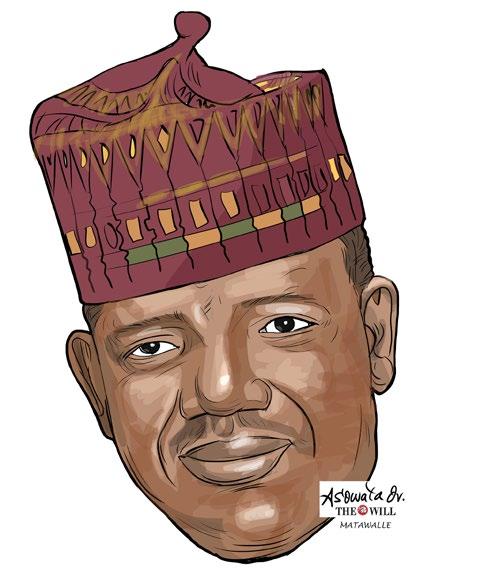
the 2027 election. He said, “I want to make this public. I met with leaders of a political party in the opposition, and they openly admitted that this government gives them N50 million each.”
In his reaction, National Publicity Secretary of the APC, Felix Morka, described Atiku’s allegation as ‘simply bogus and laughable.’ According to him, peddling rumours and unsubstantiated allegations were signs of desperation by the former VP.
“Atiku’s allegation that the APC-led administration was paying out N50m to some opposition figures is simply bogus and laughable. Atiku knows that his political desperation is responsible for the PDP’s catastrophic disintegration.
The governing party’s spokesperson then took on the trio of El-Rufai, Atiku and the Presidential candidate of the Labour Party in the 2023 general election, Peter Obi.
Morka said, “The bizarre suggestion by opposition figures like Atiku, Peter Obi, and recently, aggrieved leaders like Mallam Nasir El-Rufai that our great party may be complicit in the internal corrosion of opposition parties is pitiful, and only an incompetent alibi for their crass failure to manage their affairs.
“They cannot govern their parties but tout their ability to govern Africa’s most populous country. We cannot possibly forget how Atiku’s PDP heavy-handedly captured most South-West states and vowed to remain in power for 60 years.”
Media Adviser to Atiku, Mr Paul Ibe reacted to Morka’s statements, almost immediately.
Ibe said It was an irony, “most bitter that a man who once rose to prominence on the back of civil activism and the call for democratic renewal has now found himself in opposition to the very ideals that birthed his political career. This shift from proponent to adversary of multi-party democracy is both tragic and dangerous.”
According to him, Atiku’s “prophetic warnings” have already begun to manifest.
Ibe said his principal was among the first to call attention to President Tinubu’s plans to populate the Independent National Electoral Commission (INEC) with members of his own political party, the APC. Today, the nation bears witness to this very scheme unfolding before our eyes.
Atiku, he further said, also raised the alarm over the president’s blatant conflict of interest, particularly with regard to the awarding of lucrative contracts to companies with direct ties to his family. He cautioned the nation against the authoritarian tendencies of the Tinubu administration, warning that it sought to suppress fundamental human rights by charging protesters with treason — a tactic eerily reminiscent of repressive regimes of the past.
“These warnings, though dismissed by some at the time, have proved prescient as each one materializes into a clear pattern of authoritarian behaviour by the current administration.
“Now, the opposition parties find themselves fighting for survival, infiltrated by fifth columnists who have been planted within their ranks, ensuring that no party— whether APC or opposition — remains capable of functioning independently of the president’s whims.”






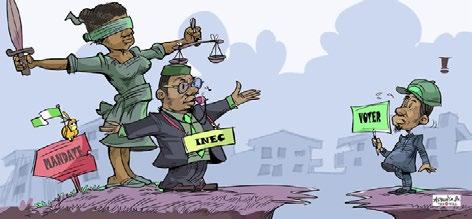











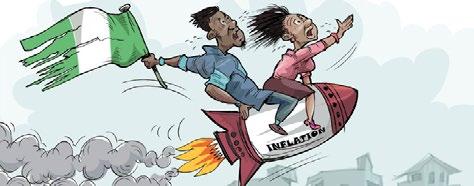






















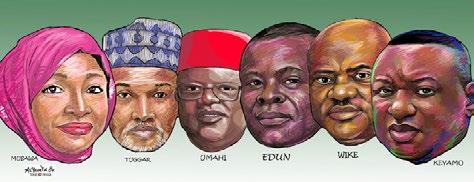

The news report that the Federal Government donated the sum of N30 million to the family of renowned designer of the National Flag, late Pa Taiwo Akinkunmi, two years after his death, is not only belated but an insult to the memory of the patriot who designed the Nigerian flag in 1958 at age 22 and got 100 British pounds for his noble effort.
The inaction, lack of concern and hesitation displayed by the Federal Government for more than a year since Pa Akinkunmi died on August 29, 2023 at the age of 87 and was buried on September 6, 2024, a year after, speaks volume about how officialdom treats patriots in this part of the world.
Apart from a government delegation sent by President Bola Tinubu and led by the Minister of Information and National Orientation, Mohammed Malagi, to pay a condolence visit, the government failed to honour its pledge to give the late Nigerian hero a state burial and financial support to the family.
One of the sons of the deceased, Akinwunmi Akinkunmi, expressed gratitude to Tinubu for the gesture.
After waiting for the promised state burial for over a year, late Pa Akinkunmi’s family were forced to proceed with his burial.
“We have to give him the befitting burial he deserves,” his son, Akinwumi Akinkunmi, told the BBC Focus on Africa podcast.
Akinwunmi told the BBC last year that “the family had waited patiently for the government to fulfil its promise, but as the months went by, it became clear that no arrangements were being made.”
He told BBC that while waiting on the

Now, apart from its people, a country is known by its flag and currency. For a man who designed the preindependence flag that passed the critical assessment of the British colonial government, his name ought to be in the lips of every of his compatriots. A national burial would have etched him in their memory forever
“
government, the family were paying N2,000 each day to keep the patriot’s remains in a morgue. “This was why the Oyo State Government decided to step in to fund the burial rites for the flag designer.”
Continuing, Akinwunmi told BBC that in June 2024 after waiting helplessly, they found out that “the arts ministry’s National Institute for Cultural Orientation was responsible for arranging a state funeral for his late father. However, despite an initial phone call, there has been no further communication or progress from the institution.”
He expressed fears that, “waiting longer will dishonour his father’s memory.”
Fortunately for them, the Oyo State Government had to step in to support the family and give a befitting burial to their father.
At the interment of the octogenarian after a funeral service held at the Obafemi Awolowo Stadium, Liberty Road, Ibadan and attended by members of the Oyo State cabinet; members of the state advisory council; former Oyo Assembly lawmaker, Honourable Ibrahim Bolomope; GOFAMINT members; personnel of various security agencies, the national choir, students of Akinkunmi’s alma mater family members, among others, the Acting Governor of the state, Bayo Lawal, had this to say: “His burial should have been a Federal Government affair, rather than being left to the deceased family and the Oyo State Government because Pa Akinkunmi represented a classic example of a national icon and the Federal Government should not abdicate its duty to give him the deserved respect and honour, whether alive or dead.”
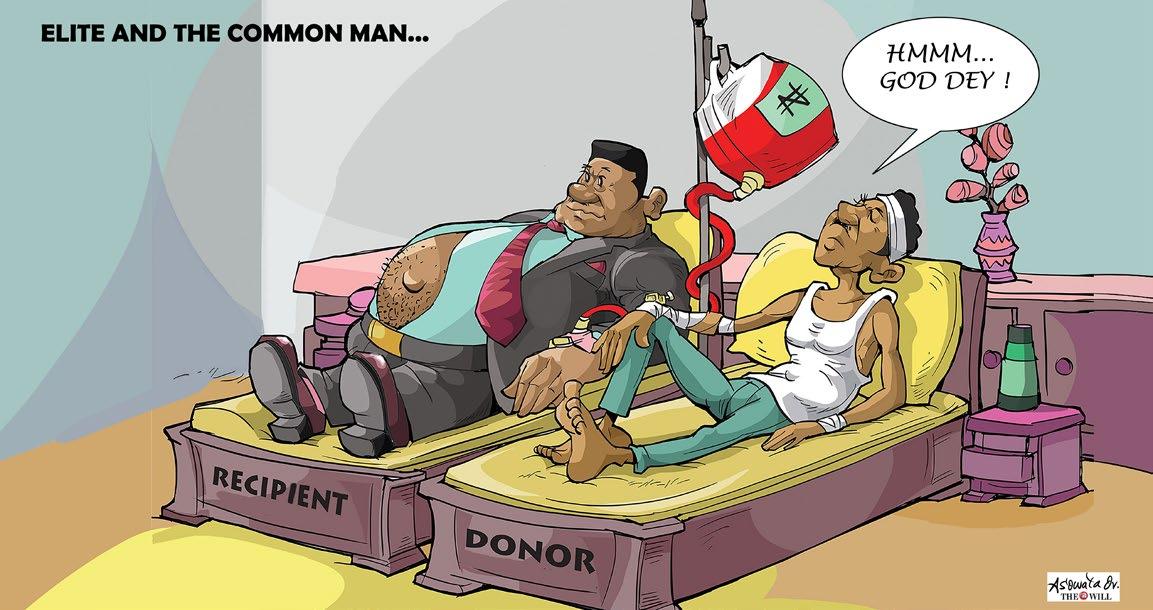



BY PRINCE CHARLES DICKSON
“My kind of loyalty was loyalty to one’s country, not to its institutions or its officeholders. The country is the real thing, the substantial thing, the eternal thing; it is the thing to watch over, care for, and be loyal to; institutions are extraneous; they are it mere clothing, and clothing can wear out, become ragged, cease to be comfortable, cease to protect the body from winter, disease, and death.”
-Mark Twain
EVERY FORM YOU FILL OUT IN NIGERIA WILL WANT TO KNOW YOUR TRIBE AND RELIGION. WHO BORN YOU? GOVERNMENT OFFICIALS REPRESENT THEIR TRIBES IN GOVERNMENT AND NOT NIGERIA. NOBODY REPRESENTS NIGERIA IN ANYTHING. WE ONLY STAND FOR OUR TRIBES TO WHOM WE OWE OUR INDIGENSHIP
In one village, there is a handsome and intelligent man named James. He is very neat and dresses well. He also speaks English and French very fluently. Usually, when someone dies, the whole village will gather and ablebodied young men will dig the grave, bury the corpse and cover it very well. The women will prepare Abacha, while the men will come with kegs of palm wine.
It is very well organised, communally. Everyone plays his/her part to make the burden light for the bereaved family.
Every time this occurred, James came with a newspaper. He would find a very comfortable position, sit and cross his legs, reading the newspaper while others worked on the grave. There seemed to be nothing wrong with this, as there were plenty of hands on the job.
One day, James’ father kicked the bucket. What a day! The whole village gathered as usual. But there was something strange about the gathering.
Guess what? Every young man came there well dressed, with a newspaper and a chair. They all sat down and read newspapers! Onyema, who did not break slate way back in primary school days, also had one, even though he held it upside down.
There was an uneasy calm that enveloped the atmosphere. The environment was hot, even
though it was early in the morning during the harmattan season. The dice was cast. It was payback time. James was about to receive the reward for his actions over the years. And so, the corpse was there, but no one was digging the grave. James came out of the house and saw the situation. He was helpless. He is the only young man in the family. His other two siblings were girls. He broke down and wept like a child. He wept not for the dead but for himself. He realized that he was a living, dead man. He pleaded for mercy but in vain. Finally, he dug the grave alone while others read their newspapers.
In a country governed by foreigners. A country that has at its head indigenes of some tribes I love Nigeria, I sincerely do because I possibly have no choice, I could love America, England, Poland, or even neighboring Ghana and become a Nigerian-Arabian or Israeli-born Nigerian it makes no difference because we are Nigerians, we are who we are…exceptional in our way...a people who for several decades have placed their hands on the self-destruct button but somehow it never detonates, we have remained on the 11:59 threshold of everything deadly, dangerous and anti-people yet it never hits 12.
So, I love Nigeria, the land where everything, anything, all things are possible. It depends only on where you stand and what you can benefit from.
From Lagos, our own New York, to Abuja, the expensive London with Beverly Hills homes only for the rich and mighty, to Rivers, Imo, Ekiti, Oyo, Ogun, our cowboy Texas…We have our Chicago-styled Police; then we have so many Bronx sites where you could get anything from fake passports to late Abacha or Abiola’s signatures.
Need I tell you about our own Afghanistan, our own Syria, or our emerging DRC, or don’t you know there are parts of Nigeria competing favourably with Mexico in terms of abductions and kidnapping? Nigeria…God’s own country in black Africa, how many times have I been told that even God is Nigerian, especially when we have goofed and expect a miracle or when we are losing a soccer match?
Nigeria is the only country in the world that has no citizens. What we have in Nigeria are indigenes. All your privileges, rights and duties as a supposed citizen depend on your “indigeneship.” Loyalty and patriotism to Nigeria because of that is zero. Everybody is a tribal lord. You cannot be anybody or authority, if you don’t subscribe to any clan, state, zone or tribe.
The Army is a national body. It has people from all walks of life and tribes as its members. It has a Defence Academy in Kaduna. You were born in Kaduna to Abeokuta parents or even Bolawa parents from Potiskum.
BY FREDRICK NWABUFO
What is a new Nigeria? What should it connote? And how can the old become new?
The thought-picker, new Nigeria, may come off as a philosophical trope as it has been noised threadbare over time. But beyond the philosophism of the motif; there is a reality, a possibility, and a need for us all as Nigerians to steer our nation to a new and better place, not necessarily an eldorado, but a place where tribes and tongues differ, but unity, peace, harmony, discipline, and strong values endure.
This is the nation President Bola Tinubu is mobilising diverse consciences to build. By my estimation, a new Nigeria is a nation where tongues do not divide, but unite; where faith does not poison the cauldron, but heals the broken and gives hope to the weak; where leaders are accountable to the people and followers live up to their civic responsibilities, where old cherished values of respect for elders and national symbols, of hard work, discipline, honesty, modesty, and good neighbourliness live supreme in the national consciousness.
A new Nigeria begins with me. It begins with you.In one of my treatises years ago titled, ‘We need the Nigerian dream and identity’, I philosophised the whys and wherefores of the Nigerian identity. I suggested surrendering to the Nigerian identity, which does not imply abandoning our roots, culture, and traditions but embracing an expansive identity for the survival of our country.
I said,‘’ It means putting the interest of the nation first; it means acting on the philosophy of the monolithic whole as against a group agenda; it means eschewing divisive utterances and actions; it means accenting our strengthens and areas of convergence, rather than promoting discord and points of divergence; it means embracing our common identity as Nigerians. It means being Nigerian.’’
To reprise the treatise, to build the Nigerian identity and dream, there is a place for leadership and a place for followership. Building Nigeria will involve Nigerians from all strata.
The place of leadership in nation-building is the place of personal example. Leadership by deed, not just by words. The leadership must inspire hope and confidence. The leadership must gain the trust of sections of the country and work to keep it.
The place of leadership in forging bonds of communality is the place of purpose and deliberateness.
The leadership must be deliberate in managing diversity and in fostering kinship among variegated people. Nation-building cannot be left to chance or to a whim. There must be purposive plans and actions towards this end.
THE SOCIAL CONTRACT IS A TWO-WAY TRAFFIC -- ONE FOR THE LEADERSHIP, WHICH MUST DO ITS STATUTORY DUTIES AND FULFIL ITS PROMISES, AND THE OTHER FOR THE CITIZENS WHO MUST LIVE UP TO THEIR CIVIC AND NATURAL RESPONSIBILITIES

The Tinubu administration has been deliberate about reviving our cherished values, protecting our national icons, healing wounds, promoting peace and development, and building a consensus of action on unity.
The deliberateness of the administration in inspiring patriotism and national pride and ensuring peace and development is evident in its many groundbreaking policies, initiatives, and programmes, one of which is the National Values Charter.
The National Values Charter is a set of ideals and principles in the social contract governing the relationship between the leadership and citizens.
For the leadership, it includes the promise of equality, democracy, entrepreneurship, peace, inclusivity, freedom, and meritocracy, and for citizens, the ideals/obligations include, discipline, the duty of care, tolerance, leadership, accountability, environmental awareness, and resilience.
The social contract is a two-way traffic -- one for the leadership, which must do its statutory duties and fulfil its promises, and the other for the citizens who must live up to their civic and natural responsibilities.The National Values Charter was approved by the Federal Executive Council in October 2024, and President Tinubu is expected to unveil the charter in the first quarter of this year.
It is a conscious effort at preserving that which is pristine - our values - and reawakening the true Nigerian in the Nigerian. A new Nigeria begins with me. It begins with you.
•Nwabufo is Senior Special Assistant to the President on Public Engagement
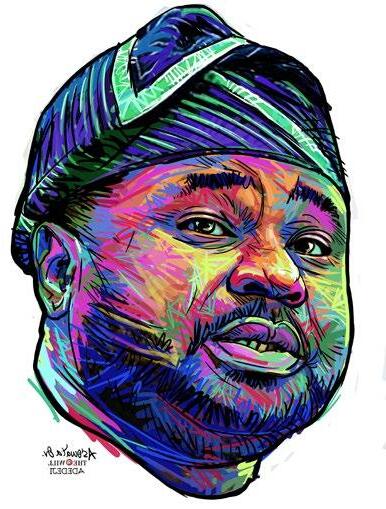
Nigeria’s tax revenue agency, the Federal Inland Revenue Service (FIRS), has elevated tax revenue practice to a scale of national priority never witnessed before now.
Although the devaluation of the naira contributed to the current revenue haul, recent performance shows the fallow grounds not explored by previous administrations, especially the immediate past President Muhammadu Buhari’s, known for the slogan, “Our problem is revenue not debt”. The FIRS generated N21.6 trillion in revenue in 2024, exceeding its initial target of N19.4 trillion by 11.34 percent.
The FIRS Chairman, Zacch Adedeji, who announced this at the agency’s 2025 strategic management retreat in Abuja, described the achievement as historic, attributing it to the dedication, professionalism, and resilience of FIRS staff, alongside strategic improvements in technology and processes.
“Together, we closed the chapter of 2024 with an achievement that will forever be recorded in the history of the Federal Inland Revenue Service: the record-breaking generation of N21.6 trillion in revenue, surpassing our target of N19.4 trillion. According to him, result was no small feat, but represents the workers’ resilience, professionalism, and dedication, coupled with visionary leadership and a strategic focus on the pillars of people, technology, and processes.
“But let me remind you that this success is not just ours to celebrate. The FIRS is more than a revenue authority; it is a cornerstone of our nation’s economic stability, a vital pillar upholding Nigeria’s progress, and an agent of renewed hope for all Nigerians,” he said. Adedeji emphasised that the agency’s role extends beyond revenue collection, as it plays a crucial part in Nigeria’s economic stability and development. Looking ahead, the FIRS chairman outlined a strategic roadmap for 2025 aimed at sustaining and improving the agency’s performance, with focus on strengthening internal capacity, modernising infrastructure, and leveraging technology to enhance tax administration.
EDITOR Sam Diala
NASENI Celebrates Halilu’s Young Global Leader Award

Investors in Nigeria’s stock market hummed delightful tunes to mark an impressive performance by the domestic bourse which enriched them with almost N2 trillion in January 2025.
The development marked a spillover of the bullish sentiments that shaped the 2024 equities performance. The Nigerian Exchange (NGX) recorded a 38 percent growth for last year, representing the highest stock deals ever seen on the domestic bourse.
Market capitaliation closed at N64.7 trillion on Friday, January 31, against the N62.7 trillion opening figure on January 2, 2025, representing a positive N1.945 trillion return, or a 3.0 percent gain year-to-date.
bullish movement in January.
Comparatively, the equivalent period of 2024 (January) recorded higher performance in both shares’ turnover and total value. Check by THEWILL revealed that the NGX recorded a total turnover of 19.3 billion shares valued at N7.7 trillion in January 2024.
Conversely, the market recorded a total turnover of 13.8 billion shares in January 2025, valued at N229.4 billion. Both periods had 22 trading days.
However, market capitalisation was much higher in 2025 with N64.7 trillion compared with N55.3 trillion in January 2024, a growth of 17 percent, while the NGX ASI rose by 3.3 percent to 104,496.12 points in 2025 to exceed the 101,154.46 points recorded in the corresponding period of last year.
A finance analyst, Macauly Ekemena attributed the higher performance of 2025 to the impact of the government reforms and the movement of the interest rate regimes during the two periods when the Central Bank of Nigeria (CBN) raised interest rates to 18.75 percent and 27.5 percent, respectively.
He noted that the removal of petrol subsidy and the devaluation of the naira changed the economic landscape of the country and affected businesses in different ways, hence investors are circumspect about their decisions which oscillate between the equity and fixed income markets. He predicts a continued bullish trend in the first quarter.
“Looking ahead, market performance is expected to be influenced by the ongoing earnings season, with sentiment likely remaining positive for companies delivering strong earnings and attractive dividends,” said analysts at Cordros Securities in a note on Friday.
In the same vein, the NGX All-Share Index (ASI) moved 1.52 percent upwards to 104,496.12 points at the close of business for the month, against 102,926.40 points at the start of the year - constituting a 1.52 percent jump year-to-date.
“This year, our mission is both ambitious and transformative: to build a service of excellence defined by the expertise of our people, the modernization of our facilities, and the innovative use of technology to enhance our processes,” he said. The agency plans to invest in capacity-building programs, improve workspaces to reflect a world-class tax administration system, and expand digital platforms for seamless tax collection.
He stated, “Capacity Building and Training: We will empower our workforce with the tools, knowledge, and skills needed to excel in modern tax administration
Continues on page 35
This impressive performance tallied with analysts’ projection of continued buoyant equities transactions in Q1 2025, as fortune-hunters take position for the imminent earning season and dividends declaration by blue-chip companies.
Investors’ behaviour is another factor. Usually, they flood to the equities market when yields in the fixed income market become unattractive.
This reflected in the intra-month trading which saw continued
MARKET CAPITALIATION CLOSED AT N64.7 TRILLION ON FRIDAY, JANUARY 31, AGAINST THE N62.7 TRILLION OPENING FIGURE ON JANUARY 2, 2025, REPRESENTING A POSITIVE N1.945 TRILLION RETURN, OR A 3.0 PERCENT GAIN YEAR-TO-DATE




Equities market kicked off the week with a bullish performance, adding N795 billion to investors’ portfolios, driven by the listing of 4.706 billion ordinary shares of Guaranty Trust Holding Company Plc (GTCO) at N44.50 per share.
Consequently, the stock market capitalisation surged from N63.645 trillion at the previous trading day to N64.440 trillion, while the All-Share Index rose by 0.79 per cent to close at 104,418.95, up from 103,598.46 recorded on Friday. This contributed to driving the Year-To-Date (YTD) return to 1.45 per cent.
Market value of GTCO Plc spiked to N2.128 trillion at the beginning of the week as the financial services group listed its public offer on the NGX.
The new shares listed increased its shares outstanding on the NGX, to 34.136 billion, and its market value surged, thus consolidating its market leadership status.
In a note, stockbrokers at Atlass Portfolios Limited told investors that the banking group had listed its public offer of 9,000,000,000 ordinary shares of 50 kobo each at ₦44.50 per share on the exchange Market value of GTCO Plc spiked to N2.128 trillion at the beginning of the week as the financial services group listed its public offer on the Nigerian Exchange. The new shares listed increased its shares outstanding on the Nigerian Exchange, NGX, to 34.136 billion, and its market value surged remarkably at the end of the month.
Analysis of the group’s performance showed that GTCO closed its last trading day (Friday, January 31,
2025) at N61.05 per share on the NGX), recording a 2 percent drop from its previous closing price of N62.30. GTCO began the year with a share price of 57.00 NGN and has since gained 7.11 percent on that price valuation.
GTCO is the eighth most traded stock on the NGX over the past three months (Nov 1, 2024 - Jan 31, 2025). The stock has traded a total volume of 1.01 billion shares—in 16,127 deals—valued at NGN N56.9 billion over the period, with an average of 16.1 million traded shares per session.
A volume high of 65.1 million was achieved on January 16th, and a low of 1.45 million on January 2nd, for the same period.
The group’s Q3 2024 ended September 30, 2024 report showed significant growth in its top line and bottom-line figures, year on year.
Gross Earnings of N1.798 trillion was recorded for the 9 months period, up by 111.47% from N850.33 billion recorded the previous year.
The group reported profit after tax of N1.085 trillion for the 9 months period, up by 195.31 percent from N367.417 billion reported the previous year. Earnings per share of GTCO stood at N36.87. Stakeholders and industry experts project a robust performance as the group prepares for the release of its FY 2024 results which would happen in the current first quarter.
GTCO has received several awards, including the 2024 Euromoney Award for Excellence for Best Bank for Corporate Social Responsibility (CSR) in Nigeria. It also won awards for financial crime prevention, fraud prevention, and risk management.

The National Agency for Science and Engineering Infrastructure (NASENI) has celebrated its Executive Vice Chairman/Chief Executive Officer, Khalil Suleiman Halilu, for being honoured with the Young Global Leader Award by ThisDay Newspaper during its recent grand 30th-anniversary celebration held in Lagos.
The award recognizes Khalil Halilu’s transformative leadership, visionary contributions to Nigeria’s technology and manufacturing sectors, and his commitment to sustainable development through innovation.
The agency in a statement signed by Olusegun Ayeoyenikan, Director of Information NASENI, noted that since assuming leadership at NASENI, Halilu has spearheaded groundbreaking initiatives that have solidified the agency’s position as a critical driver of Nigeria’s industrial revolution.
It added that Halilu’s leadership has led to 35 market-ready products for use by Nigerians and closed deals on 44 projects with Agency’s partners, ready for launching or commissioning.
Speaking on the award, Halilu expressed gratitude to ThisDay Newspaper for the recognition, dedicating the accolade to the entire NASENI team.
“This award is a testament to the collective efforts of the NASENI family in advancing innovation and ensuring Nigeria remains


“Through targeted, high-impact training programmes, aligned with global best practices, we will enable you to navigate complexities, embrace innovation, and provide stellar service to taxpayers.
“Infrastructure and facility enhancement: This year, we will continue to invest in revitalizing our workspaces, ensuring they reflect the vision of a world-class institution.
“From modernised offices to sustainable practices, our facilities will serve as an environment that fosters excellence and productivity,” he added. In addition, FIRS will integrate emerging technologies to unify national tax collection systems and improve taxpayer services.
Meanwhile, the National Assembly Joint Committee on Finance has set a N25 trillion revenue target for FIRS in 2025, raising expectations for further improvements in tax administration and collection. Crunching the figures, the Coordinating Director of Large Taxpayers Group, Amina Ado, said the contribution of non-oil taxes to the revenue pool grew by 97 per cent, just as there was a significant increase in debt recovery in 2024.
She said all non-oil tax types like Companies Income Tax (CIT), Value-Added Tax (VAT) and others exceeded their target, with tax from oil being the only tax type that performed below expectation due to lower crude output of 1.55million barrels per day instead of 1.78million bpd.
Ms Ado, however, said despite the low oil production, oil tax went up by 35 per cent compared to what it contributed to the pool at the end of 2023. She highlighted how the quick
resolution and increase in the number of audit cases from 4,980 in 2023 to 8,046 in 2024 contributed to the high revenue performance in 2024.
Earlier, the chief of staff to the FIRS chairman, Tayo Koleosho, said the organisation had laid the foundation for an impactful 2025, noting that the management would focus more on collaboration to reposition the agency further. “FIRS recognises its workforce as central to effective tax administration and will prioritise developing technical and managerial competencies through targeted training.“
“These initiatives will enhance datadriven decision-making and equip staff to address evolving challenges in tax policy, compliance, and enforcement within a modern revenue system,” Mr Koleosho explained.
He added, “In 2025, FIRS will position technology as a central driver of tax administration by expanding integrated systems for end-to-end digital processing, enhancing taxpayers’ platforms for seamless access, and leveraging emerging technologies for audits, compliance, and fraud detection to unlock new revenue opportunities.” At the retreat, the FIRS also reported a substantial rise in Nigeria’s Value Added Tax (VAT) collections, which reached N6.72 trillion in 2024, reflecting a 84.62% year-on-year (YoY) increase compared to N3.64 trillion recorded the previous year.
According to the data presented by Amina Ado, VAT collections in 2024 demonstrated remarkable growth across both import and non-import categories.
at the forefront of technology and engineering infrastructure. It inspires us to work even harder toward creating solutions that empower industries and communities,” he said. The Young Global Leader Award reflects Halilu’s visionary leadership, under which NASENI has implemented numerous landmark projects, including the development of sustainable green technologies, the establishment of world-class manufacturing facilities, and strategic collaborations with local and international partners to boost Nigeria’s economic growth and development.
ThisDay Newspaper, celebrating three decades of excellence in journalism, selected Halilu alongside other exceptional leaders for their exemplary contributions to societal development and innovation.
The award ceremony, held at the Eko Hotel and Suites, Lagos brought together luminaries from across Nigeria’s public and private sectors to celebrate excellence and leadership.
NASENI, under Khalil Halilu’s leadership, reaffirms its commitment to fostering innovation, industrialization, and sustainable growth in Nigeria. This recognition serves as a further motivation for the Agency to continue breaking new grounds in science, engineering, and technology for national development.
ASENI EVC Honoured with Distinguished Award for Engineering and Industrial Innovation at NEAPS 2024
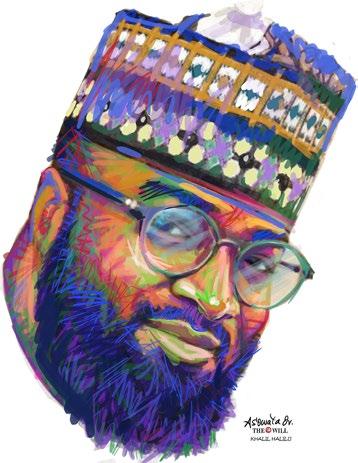
Halilu, was earlier honoured with the distinguished award for Engineering and Industrial Innovation at the 2nd edition of the Nigeria Excellence Awards in Public Service (NEAPS) in July 2024.
The award which was presented by the Vice President of Nigeria, Sen. Kashim Shettima, GCON on behalf of President Bola Ahmed Tinubu GCFR, underscored Mr. Halilu’s stellar performance and transformational leadership during his first year in office.
The agency noted that Mr Halilu’s
recognition was a testament to his unwavering commitment to making NASENI a hub of technology transfer and innovation not only in Nigeria but across Africa.
“Under Halilu’s leadership, NASENI has witnessed transformational reforms aimed at fostering technological advancements and industrial growth. “His visionary approach has driven the agency to new heights, with key initiatives that have positioned NASENI as a leading hub for innovation and proving the manufacturing capabilities of Nigeria.
“These efforts have included the development of cutting-edge technologies, the promotion of sustainable industrial practices, and the fostering of strategic partnerships with leading industry players to enhance Nigeria’s competitive edge in the global market,” the agency said in a release forwarded to THEWILL
“This award is a recognition of our commitment to advancing engineering and industrial innovation in Nigeria. It is a testament to the efforts of the entire NASENI team, and I am deeply honored to accept it on their behalf,” Mr. Halilu stated in his acceptance speech.
He added that NASENI remains committed to its mission of fostering sustainable development through technological innovation, and this award is a strong validation of its ongoing efforts to make a lasting impact on the nation’s industrial landscape.

BY MARCEL OKEKE
Preparation by the National Bureau of Statistics (NBS) to rebase Nigeria’s Gross Domestic Product (GDP) is on a crescendo already. A few days ago, in pursuit of the objective, the NBS and the Nigerian Economic Summit Group (NESG) jointly held a sensitisation and public enlightenment workshop on the initiative, the methodology and its likely outcome(s).
The GDP is the globally accepted indicator that measures the total value of goods and services produced within a country’s borders over a specific period, usually a year. GDP provides an overview of a country’s economic performance and growth. Rebasing the GDP entails adopting a new and more recent reference year to which future values of an economic variable are measured against.
Rebasing affords an economy the opportunity to update weight and prices based on structural changes in the consumer and/or production patterns over time. This is why the United Nations Statistical Commission recommends a review or rebasing of GDP every five years. This is because the weighting of component items in a base year may no longer be reflective of reality, resulting in exaggerated estimations.
For the proposed GDP rebasing, the NBS has chosen 2019 as the new base year; and this replaces 2010 which has been in use since 2014 when Nigeria last rebased its GDP. The NBS says the selection of 2019 is guided by factors such as overall economic stability, the impact of COVID-19, the availability of administrative data, and the completion of several significant surveys and data collection exercises.
All these, the NBS says, have enabled it to capture hitherto unreported or underreported activities in the Digital Economy; the Pension Fund Administrators; National Health Insurance Scheme (NHIS); Nigeria Social Insurance Trust Fund (NSITF); Modular Refineries; Domestic Households as employers of labor. Others include Quarrying and other Mining activities; and illegal and hidden activities (including smuggling, underground businesses, call girls duties, etc.).
Without a doubt, this expanded dragnet that captures practically all socio-economic activities stand the chance of leading to a GDP that really approximates the current size and makeup of the Nigerian economy. This stance is strongly buttressed by the 2014 experience, when Nigeria’s GDP rebasing threw the country up as the largest economy on the African continent.
Specifically, the 2014 rebasing increased Nigeria’s GDP estimate by a whopping 89 percent, making it the largest economy in Africa, surpassing South Africa. The new GDP reflected the country’s growing services sector, including Nollywood and mobile phone services. From about US$270 billion, Nigeria’s ‘new’ GDP shot up to about US$510 billion.
The 2014 rebasing also shifted the sectoral composition of Nigeria’s GDP, with services now contributing more than previously thought. The telecom industry in particular accounted for over a quarter of the phenomenal increase in GDP estimate. The fraction of the economy devoted to oil
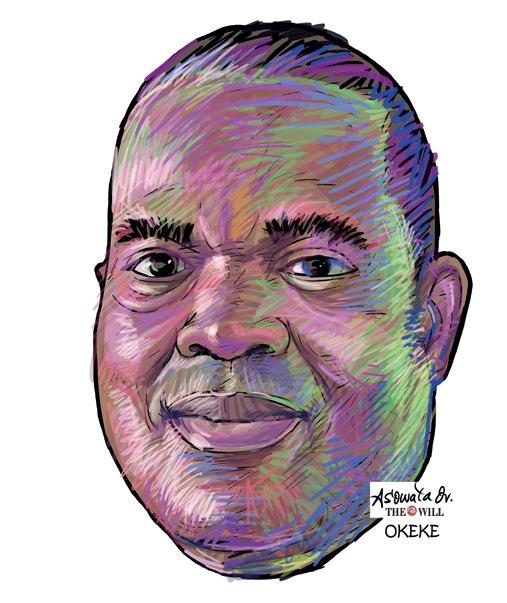
reduced by more than half to 14 per cent. However, since hitting these figures, Nigeria’s GDP has literally been on a roller coaster; going through vicissitudes and buffeted by exogenous headwinds from across the globe. Mainly foreign exchange (FX) quagmire and productivity challenges have combined to shrink the economy to less than US$200 billion by end-2023: making the Nigerian economy rank fourth—behind South Africa, Egypt and Algeria.
However, Nigeria’s macroeconomic challenges in recent years, which have seen not a few blue chips opting to leave the country, have the capacity to shrink rather than expand the economy. And which is why the ongoing GDP rebasing could result to higher figures in nominal terms, but may not translate into any tangible increases in real GDP. While the 2014 GDP rebasing, alongside the prevailing economic environment, could attract investors from within and outside the country, today’s climate is markedly different. Inflation rate is at a thirty-month high—standing at 34.80 percent at end-December 2024. Exchange rate volatility has remained almost intractable: with the naira depreciating irreversibly against the US dollar and other hard currencies.
As against the Nigeria of 2014, insecurity in the land has become an existential threat— terrorism, banditry, kidnapping, armed robbery, ritual killings, etc.—have become the order of the day. Structural issues are
yet in place, including huge infrastructure deficit, corruption, and so much dependence on inflow from crude oil sales.
In this milieu, rebased GDP, no matter how huge the figures turn out to be, may not translate to any magic wand in pursuit of national economic growth and progress. Its cosmetic appeal becomes only a necessary but not sufficient condition for sustainable economic expansion and development. It is in this vein that the outcome of the recent change of methodology in the computation of the unemployment rate in Nigeria by the NBS has served as only a psychological illusion. While the unemployment rate (especially youth unemployment) was almost hitting 40 per cent (using the old method), the rate crashed to between four and five per cent sequel to the adoption of the new methodology by the NBS in 2023.

Today, even with the change in unemployment calculation method by the NBS, the (absolute) number of unemployed persons in Nigeria rather than dropping, has remained on the increase.
This trend is underpinned by the number of companies that have either shut down or downsized due to the harsh operating environment in the past couple of years. So many Small and Mediumsized Enterprises (SMEs) have been scorched to extinction, just as many big companies have fled the country.
It is therefore not enough to parade the toga— Africa’s largest economy—but remain repulsive rather than attractive to investors. This is why the rebased GDP could end up as a mere placebo, as against any deliberate measure for the nation’s economic advancement. A placebo being a measure merely designed to humor or placate people.
This is akin to the mindset that informed the adoption of palliatives as support to largely failing economic policies of the Federal Government for close to two years now.
The palliatives, mere crumbs, have turned out to be economic placeboes deployed by the Bola Ahmed Tinubu-led administration to assuage the hunger and anger of the citizenry—in the face of mounting economic hardship.
Rebasing the GDP entails adopting a new and more recent reference year to which future values of an economic variable are measured against

It is therefore most apposite to admonish that rebasing Nigeria’s GDP by itself can neither stimulate the economy nor grow it. The massive ‘baggage’ of other challenges bugging the economy are a major counterpoise to meaningful economic progress. So, the question remains: is the rebasing of Nigeria’s GDP this time, most likely to be a mere placebo or an economic stimulus?
•Okeke is a practising Economist, Business Strategist, Sustainability expert and ex-Chief Economist of Zenith Bank Plc

BY TOBY PRINCE
In the heart of Nigeria’s digital economy, a story of patriotism and resilience unfolds. The telecommunications sector, a driving force behind the country’s growth, has been facing unprecedented challenges. Despite its significant contributions to Nigeria’s social and economic development, the sector has been struggling to keep up with the rising costs of operations.
For nearly a decade, telecom tariffs in Nigeria remained unchanged, while the demand for data and voice services skyrocketed. The cost of operations, however, surged due to rising energy costs, inflation, currency devaluation, and increased costs of importing telecom equipment. These mounting expenses threatened the very foundation of the sector, making it difficult for operators to maintain infrastructure and deliver high-quality services. In the face of these challenges, telecom operators requested tariff adjustments to reflect the current cost of delivering services. The Nigerian Communications Commission (NCC) carefully considered these proposals, balancing the needs of operators with the interests of consumers.
Instead of approving the suggested 100% rate increase, the NCC authorized a maximum adjustment of up to 50% within the current tariff bands.
The NCC plays a vital role in regulating the telecommunications industry in Nigeria, and its actions are guided by the Nigerian Communications Act of 2003. This act empowers the body to regulate and approve tariff rates and charges by telecom operators, ensuring a balance between consumer protection and industry sustainability.
The NCC’s decision to approve tariff adjustments was not taken lightly. It was based on extensive consultations with stakeholders from both the public and private sectors. The goal was to strike a balance between the financial realities of telecom operators and the economic pressures faced by Nigerian households and businesses.

The approved tariff adjustments were capped at 50%, significantly lower than the 100% increase requested by operators. This decision showcases the NCC’s commitment to creating a telecommunications environment that works for everyone.
To further protect consumers, the NCC mandated telecom operators to implement the approved adjustments transparently and fairly. Meanwhile, operators were also required to educate and inform the public about the new rates, ensuring customers are fully aware of any changes to their billing structures. Additionally, the NCC’s updated Quality of Service Regulations empower it to sanction operators who fail to meet their service obligations.
Nigerians need to understand that the recent tariff adjustments in the telecommunications sector are a necessary step towards ensuring the long-term sustainability of the industry. These adjustments will enable operators to invest in infrastructure upgrades and innovation, ultimately providing opportunities for local businesses to thrive.
A robust telecommunications sector is crucial for achieving Nigeria’s digital economy goals, including e-commerce growth, broadband penetration, and digital inclusion. The tariff adjustments will strengthen operators’ contributions to these objectives by providing connectivity to underserved and rural areas, driving innovation, creating jobs, and boosting economic
productivity.
Since 2013, telecom operators have grappled with escalating costs without corresponding adjustments to the tariff rates they offered. Without tariff adjustments, operators risk being unable to sustain their operations, leading to service degradation and potential job losses within the industry. This would increase the rate of unemployment in the country, contributing to the hardship the government has been fighting hard to eradicate.
The telecommunications sector is capital-intensive, requiring continuous investment in infrastructure to meet growing demand and improve service quality. The approved tariff adjustments will provide operators with the financial resources needed to invest in network expansion, upgrade existing infrastructure, and enhance customer service.
This will ultimately benefit consumers by delivering better connectivity, reduced downtime, and wider network coverage.
It’s worth noting that the Nigerian Communications Commission’s (NCC) approval of tariff adjustments aligns with international best practices, ensuring Nigeria stays competitive in the global telecommunications landscape. By maintaining tariffs within the bands outlined in the 2013 NCC Cost Study, the Commission has ensured that the adjustments are both fair and evidence-based. Furthermore, the NCC’s modest tariff adjustment was influenced by the financial strains that many businesses and households are experiencing. In the context of the broader economy, the long-term benefits of the slight increase in consumer bills far outweigh the immediate costs.
Benefits such as expanded coverage, improved network quality, and enhanced customer service will provide greater value to consumers, further ensuring they receive a greater telecommunications experience.
In order to mitigate the impact on vulnerable consumers, the NCC has mandated that operators simplify their tariff structures, and offer affordable plans that will be suitable to different income levels.
Additionally, the Commission will continue to monitor the implementation of the adjustments to ensure compliance with its guidelines and protect consumers from exploitation. This action validates the Commission’s goal of ensuring that Nigeria remains at the forefront of digital innovation and connectivity in Africa.
As a regulator, it is obvious that the NCC is not only protecting consumers, but also supporting operators,
Without tariff adjustments, operators risk being unable to sustain their operations, leading to service degradation and potential job losses within the industry

indigenous vendors, and suppliers who form the pillar of the telecom industry.
It is worthy of note to state that the adjustments have no relation to the ongoing tax reform conversation. This holistic approach ensures that the benefits of a thriving telecommunications sector are felt across all segments of society.
The tariff adjustments approved by the NCC are a necessary step toward addressing the financial and operational challenges faced by telecom operators. Far from being complicit in any alleged exploitation, the NCC has demonstrated commendable patriotism and a deep commitment to balancing consumer protection with industry sustainability. The NCC’s actions in approving the tariff adjustments reflect patriotism and national progress at its finest.
By enabling operators to invest in infrastructure, improve service quality, and support indigenous businesses, the NCC is laying the foundation for a more robust and inclusive telecommunications sector that can measure up with its international counterparts all across the globe.
The adjustments are not merely a response to current market conditions but a forward-looking strategy that will ensure Nigeria’s telecommunications industry remains a vital driver of economic growth and digital transformation.
As Nigerians, it is very important to view these adjustments as a patriotic move by the NCC to secure the future of connectivity and development in the country.
The Commission’s action embodies transparency and accountability, and it serves as a reminder that effective regulation is not about appeasing one stakeholder group over another, but about creating an environment that works for everyone. Through its efforts, the NCC is proving that a stronger, more sustainable telecommunications sector is not just a possibility but a reality within reach in no.
•Prince is a public affairs analyst
Photo Editor: Peace Udugba [08033050729]
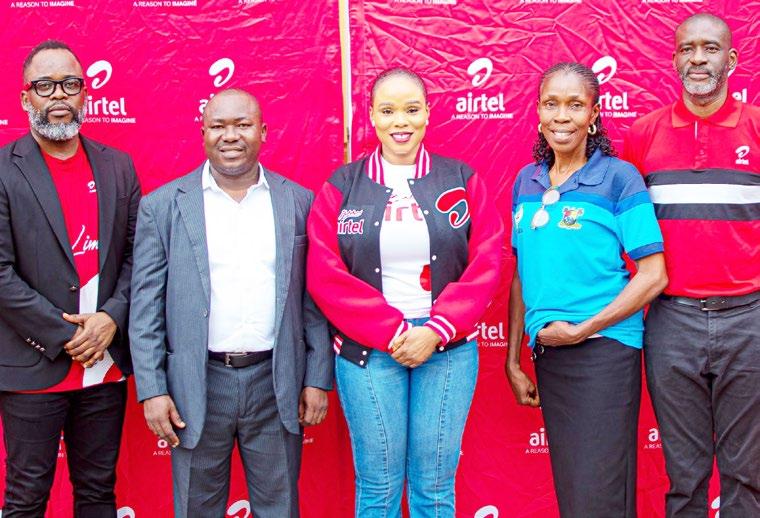
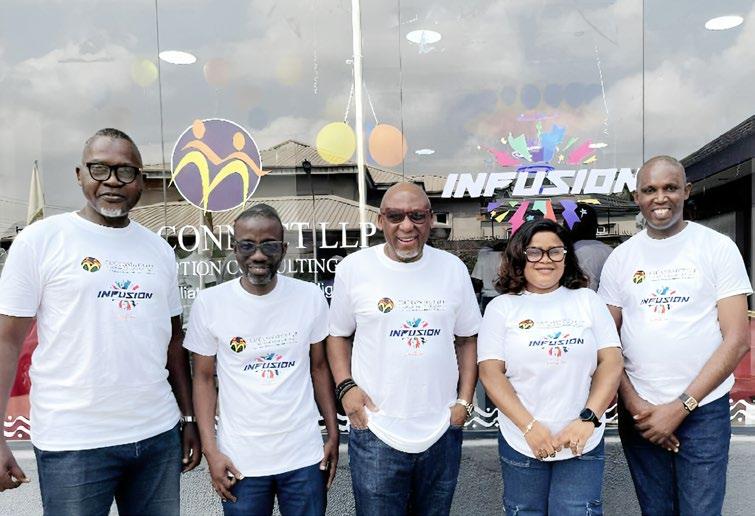
Partner Public Affairs, Adetola Odusote; Managing Partner,
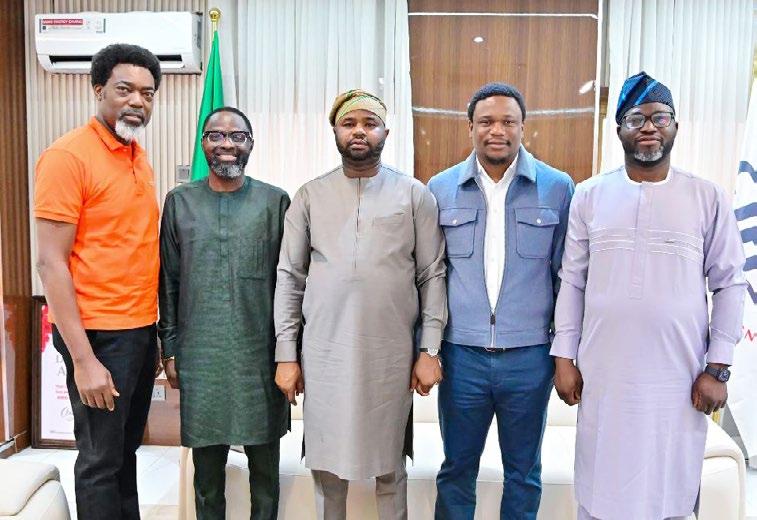
L-R: Chief of Staff to the EC, Tayo Koleosho; Managing Director, Moniepoint Microfinance Bank, Babatunde Olofin; Executive Chairman of the Federal Inland Revenue Service (FIRS), Dr. Zacch Adedeji; Chief Executive Officer (CEO) & Co-Founder, Moniepoint Inc, Tosin Eniolorunda and Special Adviser, Business Application to the EC, Abimbola Ladele, during a courtesy call on the FIRS Chairman in Abuja on January 29, 2025.

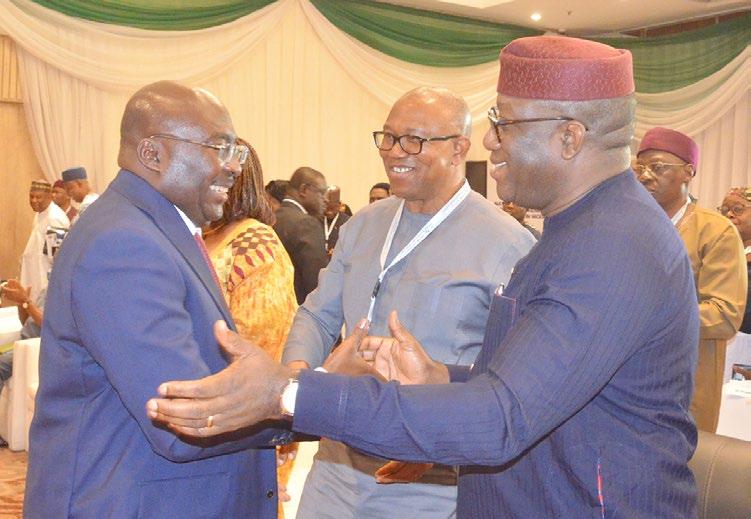
Dr. Peter Obi and the former Governor of Ekiti State, Chief Kayode Fayemi, during the National Conference on Strengthening Democracy in Nigeria, at the Continental Hotel in Abuja on January 27, 2025.
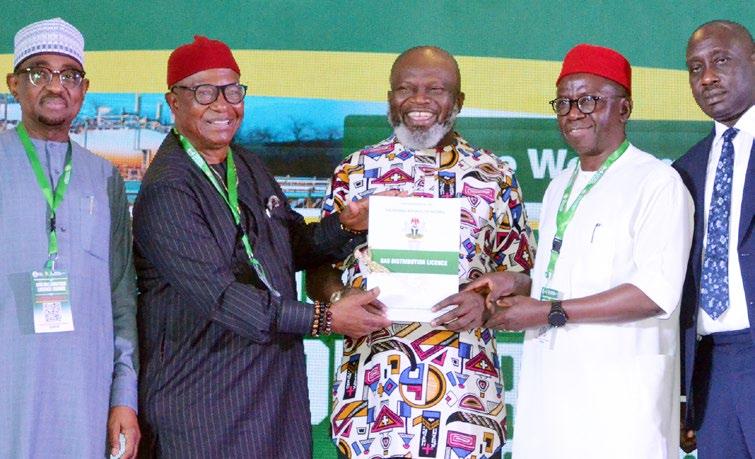





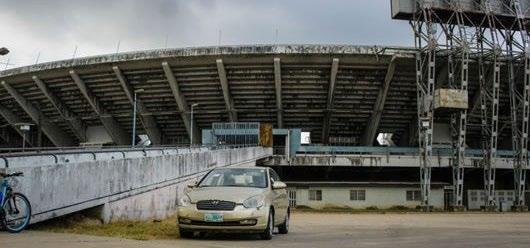
BY JUDE OBAFEMI
The National Sports Commission (NSC) is launching a comprehensive transformation of Nigeria’s sports facilities, targeting the revival of iconic stadiums nationwide through innovative public-private partnerships. Chairman of the Commission Shehu Dikko outlined an ambitious plan to rehabilitate key sports infrastructure, beginning with the National Stadium in Surulere, Lagos.
The facility, which has languished in disrepair for decades, represents the first step in a national strategy to modernise sporting venues across the country. According to Dikko, the initiative aligns with President Bola Tinubu’s Renewed Hope Agenda, with a vision to establish sports as a critical economic driver. The NSC aims to generate approximately three million jobs and contribute three percent to the national Gross Domestic Product through strategic infrastructure development.
Dikko highlighted the critical nature of the project, noting the devastating state of sports facilities that were once national symbols of achievement. Currently Nigeria boasts only one stadium meeting FIFA standards, but the NSC plans to develop at least six functional and FIFA-approved stadiums across the nation.
The rehabilitation strategy focuses on multiple stadiums across Nigeria. Key facilities earmarked for transformation include the Ahmadu Bello Stadium in Kaduna, Tafawa Balewa Stadium in

Bauchi, Obafemi Awolowo Stadium in Ibadan, and the Nnamdi Azikiwe Stadium in Enugu. The MKO Abiola Stadium in Abuja stands as a priority for the 2025 fiscal year, with plans for a comprehensive overhaul of its main bowl.
Financial commitment demonstrates the government’s serious approach to sports infrastructure. The sports sector budget has dramatically increased from N29 billion in 2024 to over N94 billion in 2025, representing a 227 percent increase. This substantial funding will support not only stadium renovations but also the construction of about 100 mini-stadiums to boost grassroots sports development.
The public-private partnership model represents a strategic approach to overcome historical challenges of infrastructure maintenance.
Dikko emphasised the need to create comprehensive sporting complexes that operate beyond traditional stadium functions. The vision includes integrating hotels, restaurants, parks, and other revenue-generating amenities to ensure financial sustainability.
Philanthropist Kessington Adebutu has already demonstrated the potential of such collaborative efforts. Under a previous “Adopt-aFacility” initiative, he supported the restoration of the pitch, tracks, and scoreboard at the National Stadium, maintaining some level of functionality during periods of neglect.
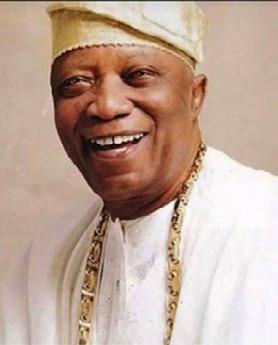
The NSC plans to leverage over 2,500 hectares of land across the country to attract private sector investment. The ultimate goal is to develop stadiums that can host international tournaments with minimal preparation time. This approach goes beyond previous stadium constructions that focused solely on basic sporting infrastructure.
Stakeholders have expressed optimism about the initiative. The House Committee on Sports Chairman, Kabiru Amadu, has urged careful management of allocated funds, hoping the increased budget will address long-standing challenges in sports infrastructure and support the numerous sports federations.
The transformation extends beyond physical infrastructure. The NSC aims to restructure the sports sector framework, beginning with the establishment of the commission and updating the Establishing Act to meet global best practices. This institutional

repositioning is crucial to creating a more efficient and responsive sports development ecosystem.
Community impact remains a central consideration. The stadiums are not merely sporting venues but potential economic and social centers that can provide opportunities for youth engagement and local development. By creating multi-purpose facilities, the NSC hopes to generate continuous economic activity and provide positive outlets for young Nigerians.
The economic projections are promising. The initiative targets creating direct, indirect, and induced jobs while positioning sports as a significant contributor to the national economy. This approach recognises sports not just as a recreational activity but as a potential economic powerhouse.
Yet, the challenges remain significant. The NSC must navigate complex bureaucratic processes, mitigate corruption risks, and attract investors in a potentially volatile economic environment. However, Dikko remains confident that transparent processes and clear incentives will overcome these obstacles.
The plan includes specific strategies for each stadium. For instance, the Nnamdi Azikiwe Stadium in Enugu will play a central role in the 2026 National Sports Festival. The MKO Abiola Stadium in Abuja is set for a complete transformation, with plans to collaborate with an international group to create a comprehensive sports city. Government engagement extends to both federal and state levels. The NSC is working closely with state governments to ensure that all available stadium infrastructure, whether state or federally owned, receives necessary upgrades to advance sports development.
The initiative represents more than infrastructure development. It symbolizes a national commitment to revitalising sports as a critical component of economic and social progress. By transforming neglected stadiums into modern, multi-functional complexes, Nigeria can create sustainable sporting ecosystems that will generate revenue, create jobs, and inspire future generations.
While stadiums across the country prepare for renovation, there is a palpable sense of anticipation. The National Stadium in Lagos, once a symbol of neglect, may soon become a testament to Nigeria’s sporting potential, reflecting the nation’s ambition and determination to excel.
The success of this initiative will depend on continued commitment, strategic planning, and effective collaboration between government, private investors, and local communities. If successful, it could set a precedent for infrastructure development not just in sports, but across various sectors of the Nigerian economy.
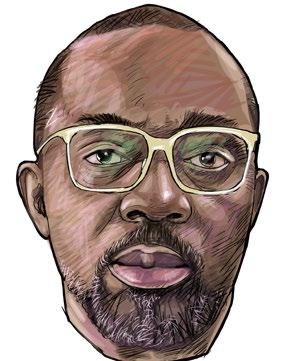

ogannah@thewillnews.com
Theagreement within the Peoples Democratic Party to rotate power between the north and the south played a major role in shaping Nigeria’s political landscape. This informal arrangement was a response to the circumstances surrounding the annulled June 12, 1993, election presumed won by Moshood Kashimawo Olawale Abiola, a Yoruba man.
When the military handed over power to civilians in 1999, the choice of Olusegun Obasanjo, another Yoruba man, was a deliberate move to address the injustice of Abiola’s annulled electoral victory and subsequent death. The understanding was that after two terms of eight years in the south, power can then shift to the north for another eight years.
At the end of Obasanjo’s tenure, he maintained this agreement by persuading Peter Odili, a strong southern contender, who would have won the PDP’s presidential ticket, to step aside. This allowed Umaru Musa Yar’Adua from the north to emerge as the candidate and eventual president.
However, Yar’Adua’s presidency was cut short by illness and his subsequent death in office, bringing his vice president, Goodluck Jonathan, into power. This development disrupted the rotation agreement, leading to growing discontent in the north.
When Jonathan decided to contest again in 2011, the north saw it as a betrayal, believing that the region had not completed its full term. Despite the pushback, Jonathan won the election but faced increased opposition throughout his tenure.
By 2015, the opposition, led by Bola Ahmed Tinubu, capitalised on the growing dissatisfaction. Tinubu, a shrewd political operator, played a central role in uniting various opposition groups to form the All Progressives Congress.
The selection of Muhammadu Buhari, a former military head of state from the north, was a masterstroke that secured overwhelming support from the region. This coalition brought an end to the dominance of the PDP, which had held power since the return to civilian rule in 1999.
During Buhari’s presidency, Tinubu worked strategically to position himself for power. He understood that a divided opposition was key to his success, and it was to his advantage that the PDP remained in turmoil.
To worsen their case, the PDP faltered again in 2023 when it ignored its own zoning arrangement and fielded Atiku Abubakar, a northern candidate, instead of choosing someone from the south. The same Atiku, who had weakened the PDP when he decamped to the APC, had only just returned to the ranks of the PDP. This decision alienated southern members of the party, particularly Peter Obi and Nyesom Wike, who had been a major donor to the PDP during Atiku’s absence.
The internal divisions within the PDP played directly into Tinubu’s hands. He capitalised on the resentment by offering Wike and his group a deal for support, which included

a ministerial position in his administration and political appointments, effectively weakening the main opposition party further.
With Wike on his side, Tinubu ensured that the PDP’s internal conflict deepened, leaving them incapable of mounting any real challenge to his government till date. The Labour Party, which emerged as an alternative in 2023 on the back of Peter Obi, has also been plagued by leadership disputes, further diminishing the strength of opposition politics in Nigeria.
With the major opposition parties in disarray, defections to the ruling APC have become the norm. Politicians who see no future in a weak and divided opposition are making the strategic decision to switch sides, positioning themselves for relevance in the next election cycle. This is a continuation of the same political calculations that saw PDP stalwarts join the APC in 2015 when it became clear that Jonathan’s administration was vulnerable.
Tinubu’s ability to manipulate political dynamics to his advantage is evident in how he has kept the opposition in check. He does not just rely on incumbency; he actively creates conditions that prevent opposition parties from becoming a real threat. By securing the loyalty of key figures from rival parties, he ensures that their structures remain fragmented. His approach is not new. It mirrors the tactics used in the past when the PDP
was at its peak and opposition parties struggled to form a united front.
The current political landscape suggests that the next election might be an easy win for the APC. Challenging an incumbent has always been difficult in Nigeria’s political history. When opposition parties are strong and united, they stand a chance, but when they are weak and divided, victory becomes impossible. The PDP and the Labour Party face a critical challenge—whether to continue their infighting or to learn from Tinubu’s playbook by forming a coalition capable of competing at the highest level
Instead of consolidating their forces, opposition figures continue to operate in isolation, each believing they can fight a battle that requires collective strength. The APC, under Tinubu’s leadership, has mastered the art of strategic alliances and long-term planning. The opposition, on the other hand, has repeatedly failed to adapt. This failure to evolve has made it easier for Tinubu to tighten his grip on power, ensuring that any threat to his administration is neutralised before it gains momentum.
The implications of a weakened opposition extend beyond party politics. Nigeria operates a democracy where a strong opposition is necessary to hold the government accountable. When the ruling party faces no real challenge, governance suffers, and the citizens bear the consequences. Without a credible alternative, elections become mere formalities, reinforcing the dominance of one party at the expense of democratic competition.
For the PDP and Labour Party to remain relevant, they must first recognise the depth of their current problems. They need to put aside individual ambitions and rebuild their structures in a way that makes them competitive. This requires ideology, compromise, sacrifice, and a clear strategy that does not allow personal interests to override the collective goal. They must also actively court those who have left, offering them incentives to return and strengthen the party rather than allow defections to continue unchecked.
If the opposition fails to address these issues, then the APC will tighten its hold on power beyond 2027. Many politicians have already foreseen this and are making moves to align themselves with the ruling party. Tinubu has made it clear that he is not willing to take any chances. Every step he takes especially with appointments into key positions (Security, Judiciary, INEC) is designed to consolidate power and weaken any opposition that could pose a threat to his administration.
The PDP and Labour Party need to ask themselves serious questions. Are they content with playing second fiddle indefinitely, or do they have the political will to rebuild and mount a real challenge? The window to make this decision is closing rapidly. If they do not act now, they will find themselves irrelevant by the time the next election arrives, while Tinubu and his party continue to dictate the terms of Nigeria’s political future.